
Parchmentthe DUBLIN SOLICITORS BAR ASSOCIATION MAGAZINE | WINTER 2022 | ISSUE 94 DSBA.IE
GONE BUT NOT FORGOTTEN PRESIDENT OF THE HIGH COURT MR. JUSTICE BARNIVILLE CROSS EXAMINED FAMILY COURTS BILL 2022 REVIEWED
Richard Grogan and Alan Toal remembered
By consolidating your systems, LEAP provides access to the same single set of data across your practice whether working remotely or in the office, preserving consistency and compliance across your law firm.
With all your client and matter information and system centralised in the Cloud you can focus on serving your clients and practising law, not on time-consuming admin.
Work more efficiently and more accurately.
Helping law firms to work more efficiently and more accurately with a single source of truth.
leapsoftware.ie
DSBA COUNCIL 2022/2023
This edition of the Parchment pays tribute to two colleagues who died recently and who will be greatly missed in the profession –Richard Grogan and Alan Toal. A death at this time of the year is particularly poignant and such loss allows us to appreciate the people and things in our life.
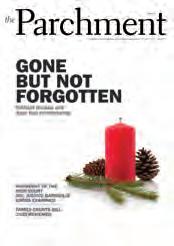
Keith Walsh SC breaks the news that the Family Law Courts earmarked for Hammond Lane have finally been given the green light. This news is to be greeted with much relief after years of waiting for the project to get approval. The new Family Court Bill 2022 is parsed and analysed by Keith in his article as the new legislation lays out new Family Court structures – not all of which are welcomed.
In this edition, Stuart Gilhooly SC interviews the President of the High Court, Mr. Justice David Barniville in a wide ranging cross examination on issues affecting the High Court whilst Avril Mangan interviews leading US collaborative family lawyer Pauline Tesler. John O’Regan BL assesses the level of
damages for psychological injuries in civil claims arising from sexual abuse cases under the Personal Injuries Guidelines and Paul Twomey BL gives an overview on breaches of personal data rights and compensation.






We also feature an article on the significant amendments to the rules on the delivery of a Defence; an update on the termination of tenancies; a recent Court of Appeal decision which clarifies the law in debt recovery actions and an assessment on the revocation of wills.
May I wish you and your loved ones a peaceful and relaxing Christmas after a long year. Here’s to a successful and healthy 2023 for one and all.
The DSBA has moved….


After several years on Dawson Street, the Of ce of the DSBA has moved to the Capel Building, Dublin 7.
Please note our new address and DX below:
EDITOR
John Geary

PARCHMENT COMMITTEE
Gerard O’Connell (Chair)
Keith Walsh SC


Áine Hynes SC
Julie Doyle


Kevin O’Higgins
Stuart Gilhooly SC

Joe O’Malley Killian Morris
COPYRIGHT
The Dublin Solicitors Bar Association
PUBLISHED BY
The Dublin Solicitors Bar Association, Unit 206, The Capel Building, Mary’s Abbey, Dublin 7
DSBA OFFICE, T: 01 670 6089
F: 01 670 6090
E: maura@dsba.ie

DX 200206 Capel Building W: www.dsba.ie
ADVERTISING ENQUIRIES
Sharon Hughes




T: 086 871 9600
Geary jvgeary@gmail.com
The DSBA, its contributors and publisher do not accept any responsibility for loss or damage suffered as a result of the material contained in the Parchment.
DISCLAIMER
Advertisements are accepted at the discretion of the magazine which reserves the right to alter or refuse to publish any item submitted. Publication

of an advertisement in the Parchment does not necessarily signify of cial approval by the DSBA, and although every effort is made to ensure the correctness of advertisements, readers are advised that the association cannot be held responsible for the accuracy of statements made or the quality of the goods, services and courses advertised. All prices are correct at
time of going to press. Views expressed are not necessarily those of the DSBA or the publisher. No part of this publication may be reproduced in any form without prior written permission from the publishers.
From the Editor WHEN YOU HAVE FINISHED WITH THIS MAGAZINE PLEASE RECYCLE IT. Winter 2022 dsba.ie the Parchment 1
JESSICA HICKEY
GERARD O’CONNELL Chair of the Parchment Committee
SUSAN MARTIN DSBA President
MATTHEW KENNY DSBA Vice President
PAUL RYAN Treasurer and Chair of Commercial Committee NIALL CAWLEY Honorary Secretary
John
JOAN DORAN Programmes Director Chair of Practice Mgt
RONAN McLOUGHLIN Chair of Property Law Committee
KILLIAN O’REILLY Chair of Litigation Committee
AVRIL MANGAN
CIARA O’KENNEDY Chair of Employment Law Committee
CIARA HALLINAN Chair of Criminal Law
EIMEAR O’DOHERTY Chair of Inhouse
STEFAN O’CONNOR
PATRICK LONGWORTH Chair of the Younger Members Committee
I was hesitant about applying because I was sure people thought who is this whippersnapper who has only had a few months on the Court of Appeal but I just felt it might not come up again for a while page 8
Answering the Call
Stuart Gilhooly SC met the President of the High Court Mr. Justice David Barniville for a cross examination interview

That’s the Law and that’s a Fact
Kevin O’Higgins pens an appreciation of the career of the solicitor Richard Grogan who sadly died recently
A Duty of Candour
Avril Scally says that Dr. Gabriel Scally’s Final Review Report should be essential reading for all Irish health professionals
Termination of Tenancies Deferred Marissa O’Keeffe provides an update on the legislation governing termination dates of residential tenancies
Important Judgment by Court of Appeal
Valerie Shaw examines a recent Court of Appeal decision which clarifies the law in debt recovery actions
New Rules on the Delivery of a Defence
James Meighan outlines that new Civil Procedure Rules now provide for certain timeframes for the delivery of pleadings
Dublin Solicitors Bar Association
Unit 206,The Capel Building, Mary’s Abbey, Dublin 7, Ireland T: 01 670 6089 E: info@dsba.ie W: www.dsba.ie

2 the Parchment Winter 2022 Contents 8
08
14 20 22 24 ANSWERING THE CALL...
DAVID BARNIVILLE
28
Damages in sex abuse cases– an Unjust Regime?
John O’Regan BL considers the Personal Injuries Guidelines in light of victims of sexual abuse
Revocation and Revival of
Wills
Zoe Hughes analyses the recent judgment of Ms Justice Butler in the High Court
Alan Toal BL – a Tribute
Parchment Editor John Geary pays tribute to the veteran Barrister who died recently
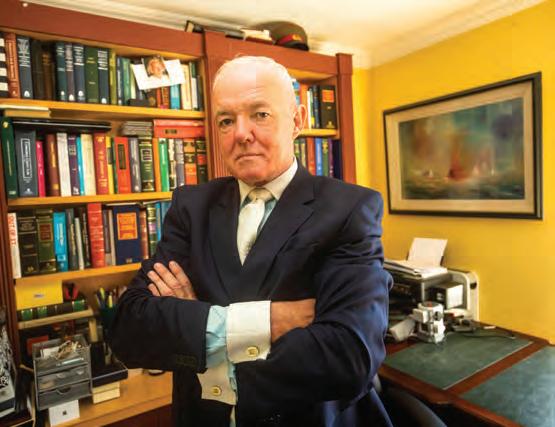

New Family Court Bill 2022
Family Law Solicitor, Keith Walsh SC reviews the newly published Family Courts Bill 2022 and points out its good and bad points
Damages for Breach of Data/GDPR?
Paul Twomey BL says that caselaw is finally providing some insight into breaches of personal data rights and the issue of compensation
Wildlife Ranger’s Epic Legal Fight

Kevin O’Higgins profiles a 12year legal battle that ended up in the Supreme Court
Queen Collaborator
Long-time California “Super Lawyer” Pauline Tesler met up with Avril Mangan on her trip to Dublin recently
Contents 01 Editor’s Note 04 President’s Message 56 News 60 Photocall 62 In Practice Winter 2022 dsba.ie the Parchment 3
REGULAR FEATURES 30 38 48 30 34 38 40 44 48 52
Message from the President
As the Year Draws to a Close
Welcome to this Winter edition of The Parchment. I am delighted to be elected as President of the Dublin Solicitors Bar Association. I want to pay tribute to my predecessor, Diego Gallagher who during his term, has undertaken sterling work on behalf of the association and indeed, the profession.
As the year comes to an end, we reflect on what has come to pass since January – what a different world we are in now. Sadly, the Ukrainian war rumbles on with devastation and loss of life. This is not something we could have imagined last Christmas.
However, we can be thankful that, facing into the Christmas 2022 holiday, we are without Covid restrictions for the first time in three years.
As solicitors we have endured many challenges during the year – we have moved from dealing with negative interest charges to high inflation. There are attacks on the rule of law all around us. Salaries and operational costs have seen significant increases. Regulation and compliance requirements are constantly rising. PII renewal has been difficult for many of us. The economic outlook is uncertain to put it mildly. This is certainly an unsettling time.
DSBA is first and foremost a collegiate and supportive association and there for us as members in good times and bad. In 2023 we will continue to bring CPD (Continuing Professional Development) education, information, social events, support, updates, submissions, representation on the issues that really matter and provide our members with assistance in every way that we can.
During 2022, the DSBA hosted an informative and lively CPD programme. One of the real watershed events of 2022 for me has been a return to in-person seminars. Having attended a number of them, what was immediately striking was the convivial bubble of conversation and a really positive atmosphere as well as insightful and challenging discussions.
More regulation is coming in 2023, with new Solicitors Accounts Regulations to commence as well as an increase in CPD hours. PII presents a continuing problem and will no doubt do so in the next renewal year. The DSBA will be with solicitors every step of the way in assisting our members to prepare for and comply with the new regulations. We will hold seminars to highlight the changes
coming our way and provide information about how to meet these challenges.
As well as all the hard work, under the careful stewardship of Diego, the DSBA saw a return to social events including the committee members’ barbeque. A Table Quiz in aid of Red Cross (Ukraine) was organised in the early Spring and as well as a great social event, much needed funds were raised for those in distress. In October 2022, the DSBA hosted a dinner to celebrate our Past Presidents – Joe O’Malley (2020/2021) and Tony O’Sullivan (2019/2020) who worked tirelessly during the Covid-19 restrictions.
2023 promises lots of social events also. We will continue to hold some in-person CPD seminars and opportunities for solicitors to meet. In January 2023, we will hold our annual Judges’ Dinner. Our Annual Dinner and Book Awards will take place on Friday 17 February next at the Westin Hotel after a three-year absence. I do hope you will be able to join me for what promises to be a fun and social event. We will also have plenty of sporting events in 2023 including our Spring hike, golf tournament and the annual cricket match.
The success of the annual conference in Lisbon in September last will be difficult to follow, but I am pleased to announce our 2023 conference will take place in London from 15 – 17 September. While many, if not all of us, have some experience of London, I am hoping that it still appeals as, in the
words of Dr Johnson “...who is tired of London, is tired of life – for there is in London all that life has to offer”. There will be a focus on historic, legal London during our conference and the very important legal, social and cultural links between our cities. After all, our legal systems and methods and many of our legal networks are more closely aligned here than anywhere else. More details will follow on our website, social media and indeed in the Spring edition of The Parchment
We can only do what we do in the DSBA through the hard work of our Council, our committee members and the personnel in our HQ and I want to pay tribute to them all in everything that they do to assist and benefit our colleagues. I am grateful to you, our members for keeping your subscriptions up and supporting our CPD programmes throughout the pandemic and for your continuing loyalty to this wonderful association.
At this time of year, we remember those family, friends and colleagues who have left us or who have been bereaved during the year. I want to especially pay tribute to DSBA member and generous contributor to our CPD and The Parchment, Richard Grogan, who passed away in November 2022 after a short illness, most bravely borne.
I hope that you will have a restful and peaceful Christmas. Thank you for your support in 2022, and here’s to a marvellous 2023.
Susan Martin, DSBA President

4 the Parchment



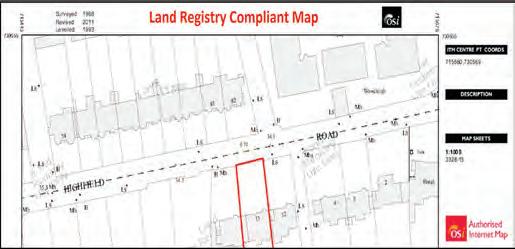
Y OUR LEG AL COST S PAR TNE R McCannSa dl ier , Lega l Cos tsA ccoun t ant s ha s ov er 1 00 years ofcombi n ed l ega l co s ts e xperie n ce. We ar e a r esul ts drive n t eam of le ga l co sts practiti on er s suppo rt ed by sp ec ial is ed sta ff. Ce ntral to our p r ac ti cei s t he sw ift at ten t io n to the pr ep arat io n ofbil ls ofco st s for a djud i ca t ion oppo si ngbi lls or ge nera l adv i ce s, in ev er y ar ea o flit ig at io n a nd non -c onte nt iou s bu siness. All of ou r p ractiti on ers ar e membe rs of th e Inst it ute of L eg alC os t s A ccoun tan ts T 01 84 07 069 E INFO@McCAN NS ADLIER. IE W McCANN SA DL I ER. IE SWORD S: 11 NOR TH ST REE T BUSINE SS PAR K, SWORD S, D UBLI N, K67 XH29. DX 9101 0 BLACK ROC K: 12 PR IOR Y O FFICE PARK, STILLO RG AN ROAD, BLACK R OCK , D UBLIN, A 9 4 N2V 3. DX 7003 t s d y s p n bi e r o n s t AN McCA P CK m a t n e C oun t a 67 XH29. UBLI LAND REGISTRY MAPPING & BER CERTIFICATION SPECIALISTS l 650 Land Registration Maps produced yearly l 2,000 Commercial & Residential BER Certs issued annually l Qualified team of Architects & Engineers registered with SEAI & Engineers Ireland l Prompt Efficient Service l Full PI Insurance COMMERCIAL ENERGY RATINGS LTD Unit 3, Churchtown Business Park, Churchtown, Dublin 14. t: 01-2983000 e: info@cerl.ie www.cerl.ie l Land Registry Compliant Maps from €225+VAT
Membership
DSBA –Our Benefits

The Dublin Solicitors Bar Association (“DSBA”) is the largest bar association in Ireland, having been established in 1935. It is a representational and not a regulatory organisation, existing to promote the welfare and interests of its members who are solicitors. The DSBA aims to promote a vibrant and up-todate profession and collegiality amongst solicitors. The DSBA offers the following benefits to members:
DSBA CPD Events – Preferential rates for members for top quality CPD [Continuing Professional Development] events held all year round. The DSBA is committed to providing a series of conferences and seminars in the next 12 months to meet the ongoing educational and information needs of its members.
DSBA Precedents – Precedent publications area available on topics including solicitors’ partnerships, residential tenancies, share purchase and sale agreements and family law and separation agreements. All these are in constant and daily use by practitioners.

DSBA Parchment Magazine – Our award winning quarterly magazine which will keep you up to date with the profession and practice.
DSBA Sports Events – Golf, tag rugby, soccer, cricket, tennis – events to promote collegiality and friendship amongst solicitors.
DSBA Social Events – Events for solicitors throughout the year and our notto-be-missed annual conference.


DSBA Submissions - Our committees and council work hard to represent solicitors and their interests – current DSBA taskforce on the Legal Services Regulation Act.



The Consult a Colleague Helpline is available to confidentially assist every member of the profession nationwide with any problem whether personal or professional free of charge. The volunteers on the panel who provide the service are all solicitors of considerable experience, www.consultacolleague.ie.
DSBA Younger Members’ Committee represents the interests, both professionally and socially, of the younger and most recently qualified members of our profession, from newly qualified up to five years PQE. The Younger Members’ Committee of the DSBA organises low cost CPD events, lectures and other events for young solicitors.
DSBA Management Tools such as - CORT – Computerised Objections and Requisitions on Title.






DSBA Website – www.dsba.ie see our regularly updated website for information on all of the above.



















For renewal and new membership please complete the form below in full and return it together with a cheque/bank draft/ postal order for the appropriate fee to Maura Smith, DSBA, Unit 206, The Capel Building, Mary’s Abbey, Dublin 7. DX 200206 Capel Building or call 01 6706089 to pay by credit/debit card.
GROUP MEMBERSHIP FEE 2023
One member €110 2nd to 5th members €105 each 6th to 10th members €100 each 11th to 20th members €95 each 21st to 50th members €85 each 51st to 100th members €80 each 101st to 150th members €75 each 151 plus members €70 each

6 the Parchment MEMBERSHIP
Parchmentthe DUBLIN SOLICITORS BAR ASSOCIATION MAGAZINE Legislation afoot as law plays catch-up HARM ON INTERNET FACIAL RECOGNITION TECHNOLOGY Garda powers to be enhanced ASSISTED DECISION-MAKING (CAPACITY) ACT New regime for practitioners SUMMER 2022 | ISSUE 92 DSBA.IE Parchmentthe DUBLIN SOLICITORS BAR ASSOCIATION MAGAZINE AUTUMN 2022 | ISSUE 93 DSBA.IE Privacy and data protection issues DRONES AND THE LAW NEW LAW SOCIETY DIRECTOR MARK
STATUTORY SICK PAY FROM 2023
GARRETT CROSS-EXAMINED


TICKETS €130 EACH. TO RESERVE TICKETS, CONTACT MAURA AT THE DSBA OFFICE ON 01 670 6089 OR MAURA@DSBA.IE DSBA ANNUAL DINNER ANNUAL DSBA BOOK AWARDS AND WESTIN HOTEL, DUBLIN 17th FEBRUARY 2023 FRIDAY BLACK TIE
Answering the Call
He has followed a gilded path to the top of his profession and one which might have been seen as the traditional rise of a star barrister to the highest echelons of the judiciary. And yet, David Barniville cuts a relaxed and modest figure completely out of keeping with the perception his CV portrays. Stuart Gilhooly SC met the latest President of the High Court who is revelling in a job tailormade for him
It's an oxymoron really. Dig deep into David Barniville’s reasoning for taking the bench five years ago and a major factor seems to be the social aspect. He’s a people person and two years at the helm of the Bar of Ireland had allowed for some of his strongest traits to come to the fore: empathy, amiability and ability to get on with people from all walks of life.
They aren’t necessarily qualities that traditionally would have topped the list that the Judicial Appointments Advisory Board was looking for in a High Court president but times change and job descriptions don’t always follow the same old tired patterns.
In fact, they are qualities that should be top of the list. Managing 45 judges is not a task to be underestimated. Like any workplace, they will all have their individual nuances that will need to be handled in different ways. Like a football manager, some will require an arm around the shoulder, others will require a more direct approach.
Continuing, and perhaps strangling, the analogy, Barniville strikes me as more Jurgen Klopp than Alex Ferguson.
And sport has featured heavily in his life
since he was born 55 years ago. His parents (father Harry and mother Geraldine, nee Houlihan) were both international tennis players and his mother, in addition to competing in Wimbledon and in the US Championships, also played squash for Ireland before taking up cycling later in life.
Both he and his two brothers were brought up in the same tradition and he played rugby, soccer and tennis. Although an alumni of Blackrock College, he was not in the Brian O’Driscoll league.
“I played rugby enthusiastically but to a very poor standard.”
If sport wasn’t going to pay the bills, the obvious avenue was medicine. Both of his parents were in the medical profession but, unlike many such families where the children follow likewise, none of the Barniville boys were encouraged.
“My father was quite disillusioned with the health cutbacks in the 1980s so neither of my parents encouraged any of the three of us to go into medicine.”
Law in UCD was where a lot of academic teenagers without a specific plan found themselves in the eighties when the points
8 the Parchment
My first job was to make an application in front of [Circuit Court judge] Jim Carroll, an old fashioned but unfailingly polite judge, and I had no papers or even knew which side I was on so that went well as you can imagine
Cross Examination

Winter 2022 dsba.ie the Parchment 9
Stuart Gilhooly SC is a partner at H.J. Ward & Co. Solicitors. He is a former President of the DSBA and former President of the Law Society
I found it difficult to adjust initially having been used to sitting alone but towards the end of my term, I was really keen on it and had many excellent colleagues on the court who were really welcoming to me
didn’t require a Leaving Certificate that warranted automatic admission to Mensa. His mother’s father (Des Houlihan of Birr) and brother (Jim) were both state solicitors for Offaly and her sister (Susan) was married to the very successful senior counsel Liam Reidy.
Reidy’s influence at Christmas dinners may well have subconsciously influenced his decision to go to the King's Inns but there can be no doubt that his uncle’s next contribution was career defining for Barniville.
He arranged for him to devil with Paul Gallagher SC. Even then, Gallagher was a Law Library titan.
“The first day I met Paul, he came out
of the house holding two massive dogs on a leash and he said ‘right we are going for a walk’. This was the first time I had ever met him. I had to take one of the dogs for a walk or rather the dog took me for a walk. I obviously passed the dog walking test and he took me on.
“My first job was to make an application in front of [Circuit Court judge] Jim Carroll, an old fashioned but unfailingly polite judge, and I had no papers or even knew which side I was on so that went well as you can imagine.
“Paul had a very broad practice. As well as commercial, he did a lot of personal injuries and constitutional work in those days. He took silk in March that year and then
arranged for me to finish the year with (now judicial colleague) Denis McDonald. Denis was only in his third or fourth year at the bar and they made an exception to allow him take me on as he was so busy.”
It couldn’t have been a more auspicious start. Gallagher’s last and McDonald’s first devil, opportunities were bound to follow and inevitably they did. He was lucky enough to be offered a research brief for the Beef Tribunal and benefited from the considerable constitutional litigation surrounding its establishment.
More tribunals followed, including the McCracken and Moriarty Tribunals where he acted for a well known politician at the centre of those inquiries.
“We are still waiting to receive fees in the Moriarty tribunal. It’s the only fee outstanding from practice. I’m still retaining my VAT registration for that reason.”
Barniville took silk in 2006 and embarked on a largely commercial and public law practice but the defining moment of his career may well have been when he was coopted to the Bar Council in 2010.

10 the Parchment
It was to culminate in the chairmanship from 2014 to 2016 and meant he really found his oeuvre. He settled in like the role was made for him and left a void for him when it was over.
“I did miss the international aspect. I found I had, what a friend called, a ‘relevancy deficit’ after I finished. I found it hard to keep the practice going for long cases when I was chairman so I moved more towards arbitration and mediation cases during that period where you had more control over your diary.
“I did go back to practice but kept up the arbitration work, with some of it outside Ireland, and then I thought if I am going to do that and am enjoying it, why not become a judge.”
He was appointed in November 2017 and four years ensued as an ordinary High Court judge. In November 2019, then President Peter Kelly asked him to take over the Commercial Court list.

It coincided with the pandemic but the list ran more smoothly than other more witness heavy areas where remote hearings were more difficult.
In the last five years, we have rarely seen as much judicial movement, largely due to the creation of the Court of Appeal and Barniville has been one of the yo-yo judges with the largest footprint. August 2021 saw his next assignment.
“I was very happy where I was in the High Court. I had been asked to move [to the Court of Appeal] but I wasn’t initially keen because of how happy I was but then they asked again and Susan [his wife] said you had better take it because they won’t ask you again. I took advice from Mary Irvine who said if you are asked to do it, you should do it. She also said you should get more experience in other areas of work. It took a while to get used to sitting with other judges. I found it difficult to adjust initially having been used to sitting alone but towards the end of my term, I was really keen on it and had many excellent colleagues on the court who were really welcoming to me.”
And of course, that must mean time to change tack again. Mary Irvine’s retirement came as a big surprise to him but he felt he couldn’t ignore the opportunity to apply for the President’s job. This is a theme in our chat. He wears his ambition lightly but it clearly burns brightly inside.
“It probably came up a few years too soon. I was hesitant about applying because I was sure people thought who is this whippersnapper who has only had a few months on the Court of Appeal but I just felt it might not come up again for a while.
It was quite a formal process with extensive interviews carried out – and I understand that a number of people applied and were interested in the position. I was very lucky and happy to be told I had got the job.”
Now that he’s in situ, he appreciates the difficulties faced by his predecessor, particularly during the Covid pandemic and is very complimentary of her term as President. A legacy of her time was repeated calls for more judges and he echoes these concerns.
“They’ve [the Government] set up a judicial planning working group which is
FAMILY STATUS Married to Susan O’Connell with two sons Harry (18), Jack (15) and daughter, Cara (almost 13) FAVOURITE RUGBY/ FOOTBALL TEAM Leinster and Ireland. Liverpool (who else!) ROCK, JAZZ OR CLASSICAL MUSIC? All depending on the mood
GREATEST INFLUENCE ON YOUR LEGAL CAREER? Too cringey to mention but many!
due to report imminently. I suspect they will recommend additional judges for the High Court and the other courts. Any additional judges would be good. The Assisted Decision Making legislation will require that all wards of court will have to be assessed which will require three judges hearing three cases a day for three years.
“I’d be very pleasantly surprised if we get 20 additional judges [the number he believes are necessary for the High Court] straight away. The working group is informed by the OECD study which determines what judges are doing during the working day. A judge
Cross Examination
Photography: Bryan Meade
Mr. Justice David Barniville at a glance
Winter 2022 dsba.ie the Parchment 11
BEST TENNIS PLAYER YOU EVER SAW? Men – without a doubt Roger Federer. Women –Steffi Graff
doesn’t just come in, sit, have lunch and sit again and then go home. There is a lot of additional work done that people often don’t see.”
Of course, more judges will need more facilities and this could be the biggest challenge, according to Barniville.
“The Courts Service is looking at how to use courtrooms. Maybe staggered use or more country venues.
“I’m not keen on doing an excessive amount online. That was very useful during the pandemic. But it had the effect though of getting people out of the habit going to court. Slowly but surely we are getting the balance right. I’m trying to encourage younger practitioners to get into court again and we are now having the common
law motion list and other lists heard on a hybrid basis and in person again.”
The Four Courts are still not back to the pre-pandemic buzz – though every month that goes by sees it edge closer to where it was. He is doing what he can bring back normal.
“I think it’s still quiet enough and there is still some nervousness around. We’ve opened the front door to the Four Courts for the first time in a long time.
“The Master’s Court will be operational again. The Master has retired but his work will be done by a new Deputy Master, John Glennon, who will be hearing discovery motions and summary judgments etc.”
One pre-pandemic source of work may not fully return. The Personal Injuries
List, so long a major source of traffic and employment for lawyers, will inevitably be quieter with the new guidelines pushing so many cases into the lower courts, which are not equipped in terms of manpower or facilities.
“President Patricia Ryan of the Circuit Court was very strong about how many additional judges she needs. The inevitable trend will be cases going down [to the Circuit Court]. So far they have not been given any more judges. It may not be at a crisis point yet but it may be a crisis in the not-to-distant future. A similar need will exist in the District Court.”
Access to justice is one of the most controversial and misunderstood aspects of the legal system in modern times. The Department of Justice seems to believe that reducing legal fees is the answer when in fact it will almost certainly have the opposite effect. Barniville believes the unofficial legal aid system operated by lawyers on a no win fee basis hasn’t got the recognition it deserves.
“People who don’t have money have been able to litigate because lawyers will take on their cases for nothing in the hope that they might win. That’s both branches of the profession and this should not be denigrated as it sometimes is. It should be praised because a lot of people who wouldn’t get civil legal aid for the type of cases involved would not get near a court room if they didn’t have solicitors or barristers willing to take a case on that basis. It creates a very unfair burden for the lawyers involved. They shouldn’t have to subsidise a legal aid system that doesn’t meet the needs of the community. There should be more credit given to lawyers to who do that.”
A former President of the Association of Judges of Ireland and the incoming chair of the Judges' Forum of the International Bar Council, David Barniville is still advocating. Although judging is his job, clearly advocacy is still his passion. His list of achievements, current and former positions are too long for this article (or anyone’s stamina) but he is only getting started.

Gentle questions about the future show he must have played cricket in his youth as well so straight was the bat he used to wave them away. In short, he would be interested at some point after his term as President expires to be on the Supreme Court but would be more than happy to return as an ordinary judge of the High Court in seven years’ time.
In the meantime, there are people to be met, cases to be decided and justice to be accessed. Expect the Honourable Mr Justice Barniville to be front and centre.
P Cross Examination 12 the Parchment
People who don’t have money have been able to litigate because lawyers will take on their cases for nothing in the hope that they might win. That’s both branches of the profession and this should not be denigrated as it sometimes is




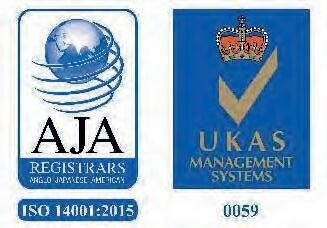



14 the Parchment
That’s the Law and that’s a Fact
Kevin O’Higgins may have been the last colleague to have met with the late Richard Grogan. Here, he pens an appreciation of the career of the well-known solicitor, who sadly died recently
Imet Richard for this interview just four days before he died. The venue was his office in Herbert Place on a sunny Friday in late November. Like many, I had been aware of his illness but not its impending terminal nature and the fact that some four days later he would be taken away from us.
Richard was at his desk, impressively suited and booted like he always was. He was both warm and engaging yet his voice was at low pitch and he complained of being hard of hearing.
While I felt it important to acknowledge his illness he did not want our discussion to dwell on same. Rather we spoke of his early career, his traineeship with Laurence Cullen in Wicklow. “He taught me the importance of the primacy of legislation as a means of unlocking legal problems in order to discover the legal solution.” This was to become a theme throughout Richard’s professional life.
He had, as he described it, in College “fallen into law” and it had even taken him a while to work out the differences between a solicitor and a barrister. But he worked it out in the end and qualified in 1982.
Richard
After a stint with Ronnie Lynam in Dun Laoghaire he veered into the capital taxes area having been headhunted by PWC who spotted an article Richard had published in a tax publication. This was then followed by a stint with O’Flynn Exhams in Cork, the ICC Bank, before becoming a partner in P.C. Moore. “I was fortunate to have worked for brilliant solicitors such as Ronnie Lynam, Paddy Rowan, Irene O’Donovan, and Clare Connellan.”
Setting up his own boutique practice in 2009 in the bespoke area of employment law and related personal injuries was audacious – especially when his career up to then had been in property, capital taxation, probate and banking. But from day one that was the route taken. He had found his honey spot. As Caoimhe McConnell from his office had remarked since Richard’s passing – “Richard was renowned for his deep passion for, and knowledge of, employment law and that’s what has crowned him as the King of employment law.”
I hadn’t realised it until Richard had told me when we met that there is no less than a bewildering 800 pieces of employment legislation. It goes without saying that Richard had a forensic knowledge of them all. His ability
An Appreciation
was renowned for his deep passion for, and knowledge of, employment law and that’s what has crowned him as the King of employment law
Winter 2022 dsba.ie the Parchment 15
Kevin O’Higgins is principal of Kevin O’Higgins Solicitors. He is a former President of both the Law Society and the DSBA. He is a former editor of the Parchment
I had attended a Law Society course on social media and someone suggested that I try Tik Tok. It was during the pandemic and I had time on my hands – so I just tried it
to read and understand terse and turgid legislation while studying taxation in his earlier career was to stand to him in coming to terms with gargantuan employment legislation both home grown and EU driven.
In no time he was to become the employment law guru – but not without a lot of hard work. His output was prolific both in terms of lectures delivered, articles in legal publications, willingness to provide articles to the media on employment matters and a ubiquitous presence on chat shows and the more serious tv and radio programmes whenever employment issues emerged.

In fact, a glance at his firm’s website for the last year alone would give one an insight into what a staggering public position he
was prepared to take in informing public awareness of employment law and how it impacts on us all. This was particularly so during the pandemic. That fallow period for us all was put to good use. It enabled Richard to showcase his talents for clear and concise explanation as to whatever impact various employment statutory instruments being rained down on us on a weekly basis by the Government – whether to do with the hospitality sector, the workplace or remote working. Richard had become the nation’s employment agony aunt and he was happy to inform and educate the public on employment law matters as it affected us all.
So just as Richard had “fallen” into law as a vocation, becoming a social media
phenomenon was not planned as a natural progression, even for such a media savvy lawyer. However, he soon became a Tik Tok sensation. How it happened Richard describes as being both unpremeditated and without too much contemplation. “I had attended a Law Society course on social media and someone suggested that I try Tik Tok. It was during the pandemic and I had time on my hands – so I just tried it.”
In fact it was only this time last year that he first ventured into the Tik Tok and Instagram platforms. He did so with resounding success. Again, he was able to play to his forte giving clear concise bitesize messages. He had no idea that it was going to become the success that it became. His notoriety was such that at one stage a pretend imposter Richard Grogan popped up on social media platforms. He spoke directly to those villains! “If you're trying to rip me off using my photograph and pretending to be me, well, I've got news for you. That's a criminal offence. And I'm going to report you to An Garda Síochána, because that's the law and that's a fact.”
The public lapped it up and he soon gathered hundreds of thousands of followers
16 the Parchment
becoming an unlikely celebrity of sorts, being stopped in the street for requests for selfies.
Certainly, this may not be what most of us can relate to and not something that he expected – but as he said at the time “I’m not 16, I don’t sing and I don’t dance”. So this was his way of getting messages across to the public in a simply understood manner. In doing so he was careful never to give advice – merely state the law. Even the trademark catch phrase “That’s the law and that’s a fact” was not conceived by a fancy PR agency – but rather a seat of the pants filler into a video clip which then became a much loved slogan.
In an interview with breakingnews.ie Richard said “What we do on Instagram and Tik Tok is short videos of between 30-60 seconds. Short and snappy. It’s not what I want to talk about – it’s what comes in-dm’s on Instagram and messages on Tik Tok. We see them coming in and then decide.” He would do no more than three a day and his following would have included the likes of Tánaiste Leo Varadkar who in a tribute to Richard following his death remarked that his staff would watch out for his videos as they were so informative.
Richard’s son James remarked at his Dad’s funeral that Richard was fascinated to monitor whatever traction his most recent offering would reach. Yet there was no great investment in technology or equipment. As he said to breakingnews.ie: “I don’t have a video camera. All I have is my i-phone propped up on the Law Society Directory and on top of that I put my keyboard.”
Perhaps, as po-faced lawyers, many of us might regard Richard’s foray into social media and becoming a Tik Tok sensation as pretty unconventional. He was once asked what he thought his colleagues might think and his answer was of the couldn’t give a damn variety – but he added that many colleagues were curious and would ask him how they might replicate it.
Richard was elected to the Law Society Council five years ago and was recently re-elected for a further term. Such was the esteem held for him that the President of the Law Society Maura Derivan gave an oration at his funeral mass and remarked that the flags in Blackhall Place had been flown at half-mast. Many of his Law Society Council colleagues were also in attendance as well as his colleagues both in practice and at the Bar. He shared the concerns of small and medium sized firms and kept that constituency in touch with matters that might impact. He was a regular contributor to the Parchment and was proud to be a member of the DSBA. To his wife Mary, son James and work colleagues Natasha Hand and Caoimhe McConnell we offer our deepest sympathies.


An Appreciation
P
Photography: Bryan Meade
Winter 2022 dsba.ie the Parchment 17
That’s the law and that’s a fact” was not conceived by a fancy PR agency – but rather a seat of the pants filler into a video clip which then became a much loved slogan
Have Your say in Respect of Civil Legal Aid
The Minister for Justice has established a Group to review the Civil Legal Aid scheme. The review represents an important opportunity for practitioners to have their say on the current system of Civil Legal Aid and how it can be improved.

The Group is seeking views with regard to nine specific aspects matters as outlined in a Stakeholder Issues paper which is available at https://www.gov.ie/pdf/?file=https://assets. gov.ie/238964/299d5b89-ae0d-4dd8-b621-
9e673d0f037e.pdf#page=null
The DSBA proposes to make a submission on this important issue on behalf of members. We invite members with experience of acting within the Civil Legal Aid scheme to contact us with their contribution. Similarly, if there are members who would be happy to assist in the preparation of the submission, this is also welcomed.
The submission must be made by Friday, 06 January 2023. If you wish your voice to be
heard, please provide your contribution to Maura@dsba.ie by 5pm on Monday 19 December.
All contributions will be reviewed and considered. Our final submission will reflect the themes that are most reflective of the views expressed and the Association reserves the right to edit the final submission as appropriate.
Lakes, Partner at Tracey Solicitors, on behalf of the DSBA Litigation Committee
18 the Parchment
Notice
Maria

Ireland’s premier dispute resolution venue Tech-enabled and supported Safe and secure Facilitating on-site and remote hearings Contact us for more information: Tel +353 1 817 5277 info@dublinarbitration.com www.dublinarbitration.ie Nine specialised rooms. Nine reasons to book. Arbitration Hearings Mediation Conferences Launches Seminars Consultation Lectures Training Covid compliant. Open for business.
‘A duty of Candour’Dr Scally’s Final Review
Dr Gabriel Scally’s Implementation Review Report November 2022 (the “Final Review”) on implementation of the recommendations made in his Scoping Inquiry into CervicalCheck Screening Programme Final Report 2018 (the “Scally Report”) was published on 23rd November, 2022. Avril Scally says that this final review report should be essential reading for all Irish health professionals
This is the concluding report, the fourth since the initial Scally Report in 2018, outlining the progress made to date by the healthcare system as well as areas where significant changes are still required.
Background: The Scally Report
The Scally Report was commissioned because of the revelations to the Irish public that the Health Service Executive’s (HSE) CervicalCheck programme had failed to disclose the results of a retrospective audit to a large group of women who had developed cervical cancer. Dr Scally himself said in the Report, “In particular, it emerged because of the extraordinary determination of Vicky Phelan not to be silenced.” It’s a sad irony that his Final Review should be published less than a week after Ms Phelan’s death.
The Scally Report found the CervicalCheck programme, and indeed, many more practices and procedures within the wider Irish healthcare system to be ‘unacceptable’, with Scally commenting that “there are many indications that this was a system that was doomed to fail at some point.”
Among the many recommendations, not least among them the urgent need for Irish-based cytology labs, patient access to their health reports and a more considered focus on women’s health generally, the requirement for a complete overhaul in terms of open
disclosure in Irish healthcare and a ‘culture of candour’ has come up again and again in both the initial Scally Report and subsequent reviews.
The Final Review
The Final Review does acknowledge that significant progress had been made – the imminent opening of cytology labs in the Coombe for example, along with an overhauled CervicalCheck procedure.
However, it seems that open disclosure, and particularly the ‘slow pace of movement’ of the government to create a framework that ‘fully supports telling patients the truth about possible errors in their care’, remains an issue. Scally laments the lack of a ‘fully formed plan to fundamentally change how patients are dealt with and regarded within the health services’.
He quotes patients who were told they could find out more about the CervicalCheck audit in the news and who say they were made to feel ‘like lepers’ when they questioned reports.
What is a Duty of Candour?
It is the responsibility of a doctor to inform a patient if they believe they have suffered a preventable harm because of a medical error. It is the duty of healthcare providers to be open and honest with patients when something goes wrong. In Ireland a policy of open disclosure was trialed by the HSE from 2010 to 2012,

20 the Parchment
with encouraging results from both patient and practitioner perspectives and has been HSE policy since 2013.
The Civil Liability (Amendment) Act 2017 which became law in 2018, was introduced to promote a culture of openness and transparency. The Act provides a legal framework to openly disclose adverse incidents and apologise for medical errors but it does not legally mandate open disclosure. At best, it encourages voluntary disclosure.
The Patient Safety Bill 2019
The CervicalCheck scandal put further pressure on the Government to introduce change. This led to the publication of The Patient Safety Note (Notifiable Patient Safety Incidents) Bill 2019 (the “Bill”). This Bill requires mandatory open disclosure of serious patient safety incidents and creates a criminal offence for failure to comply. Under this Bill, healthcare professionals may be fined up to €7,000, imprisoned up to six months or both.

The Final Review states that the Bill, which remains before the Oireachtas, will not move the requirement for open disclosure forward, in its current guise. In his 2018 Report, Scally recommended that the Medical Council ‘should put into effect its stated support for the concept of a duty and culture of candour (openness and honesty) by insisting that doctors ‘must’ be open and honest with patients rather than using the word ‘should’, which leaves it to the doctor’s judgement as to what, if anything, happens’.
This wording remains unchanged, and Dr Scally emphasises in the Final Review, quoting the Houses of the Oireachtas Joint Committee on Health and Children in 2015, ‘A duty of candour should be regarded as absolute for Irish health professionals.’
What can we Learn from Other Jurisdictions?
In the UK there is a legal duty of candour. The duty is contained in Regulation 20 of the Health and Social Care Act 2008 (Regulated Activities)
Regulations 2014, and applies to all health and social care organisations. The Core Quality Commission is an independent regulator of all health and social care in England, which places a legal duty on all healthcare providers to adhere to these regulations. The purpose of these regulations is to ensure that all healthcare organisations are open and transparent.
Following the occurrence of a notifiable safety incident, the healthcare provider must:
• Notify the relevant persons of the incident and provide an explanation of the facts known at the time, what further enquiries will be made, offer an apology, and keep a written record of the incident.
• Give the patient reasonable support; this could include practical support such as providing an interpreter or emotional support.
• Give the patient written notes of the initial discussion and of the notification, including details of further enquiries, the results, and an apology.
Duty of Candour applies when any incident including unintended or unexpected incidents occur which results in:
• death (where the death relates directly to the incident),
• severe harm,
• moderate harm,
• prolonged psychological harm.
Open Disclosure and a Culture of Candour must be a Legal Requirement in Healthcare
I have dealt with many women who have felt let down by the Irish healthcare system over the years, not just the CervicalCheck scandal but also in the Hepatitis C and Symphysiotomy cases. The Final Review’s emphasis on the need for a set framework on open disclosure and an end to the ‘paternalistic approach’ to women’s health in Ireland echoes both my own sentiments, and those of the women I’ve represented.
A clear framework would also reduce or hopefully eliminate what can be a lengthy and stressful litigation process. In the course of my work, I see time and time again that no amount of money will turn back the clock or change the outcome. But, in my experience, an acknowledgment of the clinical failing, an honest explanation of why the mistake happened and an assurance that policies will be put in place to safeguard against a repeated incidence will go a long way and will be welcomed with open arms.
The Patient Safety Bill 2019, in its current guise, does not provide for the level of clarity needed. I will watch with interest to see the Government’s response to the Final Review.
the Parchment 21 Medical Negligence Winter 2022 dsba.ie P
The Final Review’s emphasis on the need for a set framework on open disclosure and an end to the ‘paternalistic approach’ to women’s health in Ireland echoes both my own sentiments, and those of the women I’ve represented
Avril Scally is a partner and head of Medical Negligence at Lavelle Partners
Termination of Tenancies Deferred

The Residential Tenancies (Deferment of Termination Dates of Certain Tenancies) Act 2022 (No. 34 of 2022) (the Act) came into effect on 29 October 2022. This is temporary emergency legislation which prevents the termination of certain residential tenancies by deferring the termination date. Under the Act, certain tenancies which were due to terminate during the period of 30 October 2022 to 31 March 2023 known as the ‘winter emergency period’ will have the tenancy termination date deferred.
The Act aims to combat an anticipated increase in homelessness presentations over the winter period and it is intended to make such provision for those persons on a phased basis to assist in managing demands
on housing services as a result of such deferred terminations of tenancies.
A landlord can still serve a Notice of Termination during the winter emergency period. The deferred termination date will depend on two factors:
1. The period during which the termination date specified in the Notice of Termination served falls; and
2. The duration of the tenancy.
The deferred termination dates now replace the termination dates specified in Notices of Termination that fall during the winter emergency period and are summarised in a table in the Act. The following is a breakdown of the new Deferred Termination dates that will apply based on the above mentioned criteria:
Duration of Tenancy Period during which Tenancy Termination date falls
Less than 6 months
Less than 6 months
Deferred Termination date
Between 30 October 2022 and 31 January 2023 1 May 2023
Between 1 February 2023 and 31 March 202318 June 2023
6 months – 1 yearBetween 30 October 2022 and 31 January 20231 May 2023
6 months – 1 yearBetween 1 February 2023 and 31 March 20231 June 2023
1 year – 7 years
1 year – 7 years
Between 30 October 2022 and 31 January 202315 April 2023
Between 30 October 2022 and 31 January 20231 May 2023
More than 7 years Between 30 October 2022 and 31 March 20231 April 2023
Additional protections apply under s.3 of the Act for tenants with tenancies of less than six months duration where a Notice of Termination had not yet been served. Where a Notice of Termination for such tenancies is served during the winter emergency period the termination date shall not be earlier than 18 June 2022. A Notice of Termination served in contravention of s.3(1) of the Act shall be invalid.
In line with previous emergency residential tenancies legislation, a tenant will not acquire a part 4 tenancy of unlimited duration during this winter emergency period by virtue of this Act.
The Act will not apply to a tenancy where the tenant has breached their obligations such as non-payment of rent or behaving in an anti-social manner. The protections also do not apply where the landlord has
22 the Parchment
Marissa O’Keeffe provides an
update on the legislation governing termination dates of residential tenancies
served a Notice of Termination because the rented property is no longer suitable to the accommodation needs of the occupying household. In these instances, the usual rules for ending a tenancy apply.

Legislation Governing Residential Tenancies
There has been extensive legislation introduced in the past number of years affecting residential tenancies in Ireland. Whilst this article focuses on the Residential Tenancies (Deferment of Termination Dates of Certain Tenancies) Act 2022, practitioners should note that the Law Reform Commission regularly prepares an unofficial consolidated version of legislation affecting residential tenancies and the latest version, the Residential Tenancies Acts 2004 – 2022 incorporates all changes up to 26 July 2022. It does not, therefore, incorporate the changes introduced by the Residential Tenancies (Deferment of Termination Dates of Certain Tenancies) Act 2022, which came into effect on 29 October 2022.
Potential Solutions
If a landlord or tenant approaches a practitioner for advice after they have served a Notice of Termination which appears to be invalid, the existence of a slip or omission rule in s.30 of the 2015 Act may assist (which inserts s.64A into the 2004 Act). This allows an Adjudicator or Tribunal to make a determination that a slip contained in a Notice of Termination or occurred during the service of a Notice of Termination, will not of itself invalidate the Notice of Termination. This is provided that the Adjudicator or the Tribunal are satisfied that the slip concerned does not prejudice in a material respect the Notice of Termination and the Notice of Termination otherwise complies with the provisions of the Acts. Where the slip rule will not apply, the 2019 Act also introduced the concept of a Remedial Notice of Termination (s.16 inserting s.2A into s.66 of 2004 Act) which can be served within 28 days of the issue of a Determination Order by the RTB providing 28 days’ notice if the notice period in the original invalid Notice of Termination has expired.
Dispute Resolution
If a tenant remains in a rented dwelling and fails to leave on the termination date specified on the Notice of Termination, a landlord must lodge an application for dispute resolution with the RTB seeking an order for recovery of possession. In the first instance an application can proceed via Mediation or Adjudication and on appeal to a Tribunal. The carrying out of an illegal eviction, which includes prohibiting access to a dwelling or making the dwelling uninhabitable by disconnecting services, can result in damages of up to €20,000 being awarded to a tenant. The RTB can seek an injunction from the Courts to reinstate a tenant and have previously stated that they will prioritise these cases. A tenant has 90 days within which to lodge an application for dispute resolution with the RTB, if they have an issue with the validity of a Notice of Termination they have received unless the Notice has been served on the grounds of a tenant’s breach of their obligations under the tenancy in which case the period is 28 days.
Conclusion
It is likely given the extensive legislation introduced in this area over the past number of years that clients will seek legal assistance to ensure a notice of termination complies with the requirements of the Acts. Practitioners will be greatly assisted by the Law Reform Commission’s unofficial consolidated version of the Acts, however, as stated above this does not include the Act (No. 34 of 2022). The procedure for validly terminating a tenancy by a landlord for grounds other than on the default of the tenant can be broadly summarised as follows:
1. A valid Notice of Termination (NoT) within the meaning of s.62 of the Residential Tenancies 2004 Act as amended will need to be served;
2. The notice period to be given has since been extended by the Act and practitioners are reminded that in addition to the deferred termination dates under the Act, notice periods have generally been extended by legislation introduced in 2022 (No. 15 of 2022) so the LRC consolidated version of the Acts should be consulted see in particular the tables in s.66 of the 2004 Act as amended;
3. The said NoT may need to include a statement or be accompanied by a statutory declaration in compliance with s.34 & s.35 of the 2004 Act as amended;
4. A “Notice of Termination Return Form” will need to be served on the RTB (by email NoticeofTermination@ rtb.ie) on the same date the NoT is served on the tenant, together with a copy of the said NoT. The NoT will be invalid if the Return Form is not submitted to the RTB on the same date the NoT is served on the tenant.
The RTB have very helpful guidance in relation to terminations of tenancies which includes sample NoTs, statutory statements and declarations as well as a template NoT Return Form which should be of assistance to practitioners but it is not a substitute for consulting the relevant sections of the legislation.
the Parchment 23 Landlord and Tenant Winter 2022 dsba.ie P
Marissa O’Keeffe is a partner with St. John Solicitors and a member of the Property Committee of the DSBA
The carrying out of an illegal eviction, which includes prohibiting access to a dwelling or making the dwelling uninhabitable by disconnecting services, can result in damages of up to €20,000 being awarded to a tenant
Important Judgment by Court of Appeal
Valerie Shaw examines a recent Court of Appeal decision which clarifies the law in debt recovery actions

On 6 April 2022, the Court of Appeal delivered a judgment (“the Judgment”) which has clarified the application of section 17 in Part III of the Civil Liability Act, 1961 (“CLA”) as it relates to claims for the recovery of debt. The Court of Appeal judgment confirms that Part III CLA does not apply to debt recovery actions, effectively overturning two previous High Court decisions.
Factual Background to the Dispute
Brian, Kenneth and Maurice McDonagh (“the Appellants”), borrowed €21.85 million from Ulster Bank (“the Bank”) in 2008 to purchase a site at Kilpedder in County Wicklow with a view to developing it. A number of issues, including delays in obtaining planning permission and the property crash, prevented this. The Appellants were unable to meet their repayment obligations and as a result entered into a compromise agreement with the Bank in March 2013, which, if they had complied with it, would have resulted in reducing their liabilities by almost €20m. However, the Appellants breached a number of provisions of the compromise agreement which resulted in the Bank issuing summary proceedings seeking repayment of the entire debt.
The High Court Decision
Mr. Justice Twomey in the High Court found on 6 April 2020 that the Appellants were jointly and severally liable to the Bank in the sum of €22 million. A supplemental judgment was delivered on 23 June 2020 in which the High Court determined that Part III of the CLA does apply to summary
debt cases such as this. The judgment also specifically addressed the application of section 17 of the CLA relating to concurrent wrongdoers, as the Bank had issued proceedings against CBRE which had provided a valuation of the lands to the Bank in 2013 alleging that CBRE was negligent in its valuation of the Kilpedder site. Those proceedings settled with CBRE paying €5 million to the Bank.
The Appeal
The Appellants appealed. While the appeals were dismissed (save in respect of one ground which did not affect the High Court’s judgment), amongst the issues which had to be determined on appeal was the application of the CLA to the Bank’s claim, having regard to the Bank’s settlement with CBRE. The Appellants argued that section 17(2) of the CLA applied and precluded the Bank from recovering some or all of the debt. The Court of Appeal determined that before it considered the impact of the settlement with CBRE, it had to first consider whether Part III of the CLA could apply to a claim for the recovery of a debt at all. The Court of Appeal also had to consider whether CBRE and the Appellants could be considered to be ‘concurrent wrongdoers’ for the purposes of Part III of the CLA.
The Judgment
• The Court of Appeal found that the provisions in the CLA governing concurrent wrongdoers are concerned exclusively with the allocation of responsibility between wrongdoers facing legal action for the recovery of damages.
• The Court found that a claim for recovery of a debt
24 the Parchment
is not an action for the recovery of damages, but an order in the nature of specific performance of a contractual obligation.
• The law governing contribution as between, or claims as against, concurrent wrongdoers has never applied to an action for the recovery of a debt and nothing in the CLA changes that.
• The Court concluded that the earlier High Court decisions of Malocco and O’Reilly were wrongly decided.
• Even if the CLA could be interpreted in such a way that an action for the recovery of a debt and an action for damages for breach of contract are to be equated so that debt recovery proceedings come within Part III CLA, a claim against a debtor on foot of a loan facility and a claim against a valuer whose negligence is alleged to have resulted in the granting of the loan are not actions to recover the same ‘damage’.

• In this case, the debtors’ liability is for the whole of the debt while CBRE’s liability is (at most) only for the amount of the loan that the lender is unable to recover from the debtors. Accordingly, the liability of CBRE and the debtors are not concurrent.
Impact on Debtor/Creditor Relationship
The Court of Appeal noted that its decision does not have the consequence that a creditor is entitled to effect double recovery nor does it mean that a compromise with one debtor in those circumstances has no implication for another party liable on the debt. Instead, the relevant common law rules and applicable equitable principles continue to operate.
In the case of joint debtors, this means that the release of one co-debtor in an agreement which did not expressly or impliedly reserving the creditor’s rights against the others will wholly extinguish the creditor’s rights.
Where only one joint debtor has been sued, rights of contribution from other joint debtors may exist as a matter of contract or there may be a right of contribution by way of subrogation where the debtor has paid more than his or her proportionate share of the relevant debt. Chitty on Contracts states as follows:-
“Joint and joint and several debtors have a restitutionary right of contribution among themselves: that is to say, if one has paid more than his share of the debt, he can recover the excess from the others in equal shares, subject to any agreement to the contrary. In the absence of agreement to the contrary each co debtor is liable for an equal share of the debt or obligation”.
Practical Consequences for lenders
It will still be important that lenders continue to include a clause in their debt settlement agreements to expressly reserve their rights against co-debtors and/or co-guarantors.
Outcome
The Judgment is a welcome clarification regarding the provisions of the CLA specific to concurrent wrongdoers and claims for debt recovery. The Court of Appeal has confirmed that the CLA does not apply in claims for the recovery of debt and as a result the provisions of the CLA need not be considered in that context any longer.
the Parchment 25 Debt Litigation Winter 2022 dsba.ie P
A claim against a debtor on foot of a loan facility and a claim against a valuer whose negligence is alleged to have resulted in the granting of the loan are not actions to recover the same ‘damage’
Valerie Shaw is Head of Dispute Resolution at the National Asset Management Agency
Update to CPD Requirements
Since the end of February 2022, most Covid restrictions have been lifted and there has been a phased return to the workplace. As we make our way back to “normal,” the Law Society is introducing changes to the Solicitors (Continuing Professional Development) Regulations to commence at the beginning of next year 2023 (subject to Legal Services Regulatory Authority (LSRA) approval and to Government sign off).
The changes reflect the new working/learning reality with online webinars for the most part replacing in-person seminars, whilst also taking into account the inimitable value that legal practitioners garner from in-person seminar events.
Total CPD Hours – Online and In-person
The changes will mean that solicitors will have a requirement to fulfil a total of 25 hours of CPD for the 2023 CPD cycle.
No more than 80% of the CPD may be undertaken by eLearning. eLearning CPD can include online over the internet or the provision of electronic files or similar technologies being used to learn. The remaining 20% of the CPD requirements (i.e. five hours) must be undertaken in person.
Client Care and Professional Standards
Of your 25 hours of CPD, three must be under the category “Client Care and Professional Standards”. The topics for this category are:
a. Client Care.
b. Professional Standards for Solicitors.
c. Solicitors Acts 1954 to 2015 and Regulations made thereunder.
d. Accounting and Anti Money Laundering compliance.
e. The Law Society’s Guidance Notes for Solicitors and Anti Money Laundering Guidance.
f. Risk Management.
g. Data Protection.
h. The Solicitors Guide to Professional Misconduct.
i. Professional Ethics & Maintenance of Standards of Best Practice in complying with your regulatory obligations.
j. The processing of complaints against Solicitors
by the Law Society and functions of the LSRA and the Courts in relation thereto.
Professional Development and Solicitor Wellbeing
Of your 25 hours of CPD, five must be under the category “Professional Development and Solicitor Wellbeing”. The topics for this category are:
i. Financial & Business Management.
ii. Practice Management.
iii. Self-Management & Solicitor Wellbeing.
iv. Irish or English Language Enhancement as it relates to the practice of Law.
v. Foreign Language Enhancement as it relates to the practice of Law.
General CPD

The remaining 17 hours are General CPD hours on all the usual legal subjects and topics.
Senior Practitioners
Every Senior Practitioner (any Solicitor qualified more than 40 years) will have a requirement of eight hours CPD per year.
Regulations
The Solicitors (Continuing Professional Development) Regulations deal with enforcement, compliance and exceptional issues such as maternity leave/paternity leave and reduction in CPD requirements where, for example, you are unemployed for a period of time.
DSBA CPDs
The DSBA is committed to supporting its members undertaking their CPD training and offers a wide range of General, Regulatory and Management CPD seminars and webinars.
Throughout 2023 DSBA will host a range of webinars. We will also continue to hold in-person seminars, in keeping with the widely held understanding that this is the optimum way to access legal education (for example making it easier to ask questions, etc.) that also offers opportunities to meet colleagues.
To keep up to date on upcoming DSBA seminars/ webinars visit: https://dsba.ie/seminars/upcomingseminars/ or contact the DSBA Offices –Tel.: 01 6706089 - e-Mail: maura@dsba.ie
26 the Parchment
P News
Paul Ryan takes a look at new CPD (Continuing Professional Development) requirements that are on the way for Solicitors
Paul Ryan is the chairperson of the DSBA Commercial Law Committee and is also the DSBA Programmes Director


Reach the two required national newspapers for your legal notices Same day publication, same contact, one payment Call for an instant quote and hassle-free booking Starting from €140 + VAT per newspaper €270 + VAT for both 01 4993414 or email: legal@thestar.ie now part of the same publishing group
Significant Amendments to the Rules on the Delivery of a Defence
Since the enactment of S.I. No. 490 of 2021, Rules of the Superior Courts (Procedure on Default) 2021 (“2021 SI”), James Meighan says that Ireland has moved closer to the Civil Procedure Rules (“CPR”) in operation in England, which provide for certain timeframes for the delivery of pleadings and other procedural issues

CPR were designed to ensure the proper and timely conduct of civil proceedings in the English courts, and in the main, they have achieved their objective. Unlike the CPR, in Ireland before the 2021 SI, civil litigation, particularly procedural applications could get bogged down for months in the court process, which not only delayed the progress of the litigation but also ensured that certain court lists were continually full of matters adjourned, sometimes over and over, with no justification for such adjournments.
It was not uncommon in this jurisdiction, for example, for a Plaintiff to bring an application for judgment in default of defence and for the Defendant to the application to receive a number of adjournments, before being finally ordered to deliver a defence. It was also quite common, in such an application for the Plaintiff to either receive a reserved costs order, or no order for costs in a situation where the application was necessitated by the Defendant’s failure to comply with the Rules of the Superior Courts (“RSC”). The 2021 SI addressed procedures such as applications in default of appearance, delivery of statements of claim, defences, counterclaims and other pleadings.
On 8 September 2022, the Justice Minister, Helen McEntee signed S.I. No. 454/2022 – Rules of the Superior Courts (Procedure on Default) 2022 (“2022 SI”), these rules came into operation on 16 September 2022. The 2022 SI is designed to ensure the timely delivery of defences, to ensure that the pleadings in an action can be closed and the matter progresses to discovery (if relevant) and hearing and certain issues concerning applications to set aside default judgments. The 2022 SI bolsters the work commenced in and the provisions of the 2021 SI.
Applications for Judgment in Default of Defence Order 21 of the RSC provides, subject to limited restrictions, where a Defendant enters an appearance, the Defendant must deliver their defence to the action, within 28 days of the entry of the appearance. Under the 2022 SI, where a defence has not been delivered within the time prescribed under the RSC, a party may bring an application for judgment in default of defence and provided the court is satisfied that the application has been served upon the Defendant, the court will concede to the application unless they believe
28 the Parchment
it is in the interests of justice to extend the time for the Defendant to deliver their defence. Having heard the application and only where the interests of justice require, the court may extend the time for the delivery of the defence. The 2022 SI does not define the term, ‘interests of justice’ and this will be no doubt determined over time by the courts, concerning applications of this nature however, it would seem a high bar for a Defendant to reach. Where an extension for the delivery of a defence is granted, the court will attempt to determine the specific relief sought by the Plaintiff, by way of consideration of the statement of claim, to expedite matters, should the Defendant fail to deliver their defence. The amended rules do not prescribe a specific time period by which the court must extend to allow for the delivery of the defence, rather the court will consider all of the circumstances, relevant to the particular action.
Where the Defendant fails to deliver their defence, within the time directed by the court, the Plaintiff will have liberty to enter judgment, without the necessity for further orders from the court. The nature of the judgment to be awarded in favour of the Plaintiff, will be as determined by the court during the application for judgment in default of defence, if it was possible for the court to so determine the matter at that point. If the court believes that it is unable to determine the matter, on the basis of the pleadings before it, they may direct the holding of any necessary accounts or enquires or any other necessary steps, which the court determines necessary, to define more precisely the scope of the judgment which may be awarded in favour of the Plaintiff.
Where the particular case warrants an assessment of damages, the court may direct that any such
assessment may be conducted by a Judge and a jury, in case any party requires and is entitled to one, but otherwise without a jury, and, if without a jury, either by a Judge or by the Master or by the Examiner, as the Judge may direct, on evidence by affidavit or otherwise.
Applications to Set Aside Judgments –Special Circumstances
The 2022 SI amends Order 27 rule 15 of the RSC and allows the court to set aside any judgment by default on any such terms, as to costs or otherwise which the court believes appropriate. The amendment goes on to provide that if the court is satisfied that at the time of securing the default judgment, special circumstances existed which explain and justify the failure of the Defendant to defend the proceedings. The term, ‘special circumstances’ are not defined under the amended rule and if the court relies upon this rule, they must recite any such special circumstances in their order.
Both the 2021 SI and the 2022 SI will potentially alter the landscape of procedural applications in civil proceedings in this jurisdiction. When applied, these amended rules will ensure certainty to a Plaintiff on the requirements on the part of a Defendant to meet an action before the courts. The rules should also ensure that applications are not locked into an adjournment cycle which only serves to clog up the court lists and increase legal costs on all sides. Practitioners must ensure that when taking instructions, they get full details as to the proposed defence because once proceedings issue, there will be little time to consider matters in any significant way, particularly in complex commercial cases.

the Parchment 29 Litigation Winter 2022 dsba.ie P
The rules should also ensure that applications are not locked into an adjournment cycle which only serves to clog up the court lists and increase legal costs on all sides
James Meighan is a managing associate in the Dispute Resolution Team at Addleshaw Goddard
Damages for Psychological Injuries in Sex Abuse Cases
– AN UNJUST REGIME?
The recent revelations of widespread sexual abuse in private schools run by the Spiritan and Vincentian religious orders has, yet again, brought into sharp focus the “endemic” culture of abuse in schools and other institutions run by the Catholic church. John O’Regan BL assesses the Personal Injuries Guidelines that affect victims of sexual abuse
This article examines the principles currently applied to the very difficult task of assessing damages in civil claims for sexual abuse, including how the Courts have traditionally addressed the task. I say “very difficult”, because the general intention of the law in awarding compensatory damages in a civil claim for a tort is “restitutio in integrum” – to place the plaintiff in the same position as he or she had been before the commission of the tort. This is, of course, impossible in many claims for personal injuries and for other torts. But it is particularly true in a civil claim for damages by the victim of sexual abuse. A monetary award can never compensate the victim for the wrong suffered, as the Supreme Court has eloquently recognised in the past (see M.N. v. S.M. (Damages) [2005] 4 I.R. 461 at 37 and 38).

The focus of this article is on compensation for the psychological injuries suffered by victims of abuse, which in many cases are the most serious and long lasting of the injuries suffered - over and above physical injuries. Since the new Personal Injuries Guidelines (“the Guidelines”) came into force on 24 April 2021, provision is now made in the Guidelines for psychological injuries. There was no such provision in the “old” PIAB book of quantum.
For any claim brought after 24 April 2021 a Court must “have regard to” the Guidelines in assessing damages in a personal injuries action. A Court is not bound by the Guidelines, but where it departs from the guidelines, the Court must state the reasons for such departure in giving its decision. Accordingly, in the first instance, the provisions of the Guidelines which deal with psychological injuries will be examined.
30 the Parchment
Personal Injury Law
The Guidelines
Under the heading “Psychiatric Damage”, the Guidelines provide as follows at page 14:-
4. Psychiatric Damage
It is important for judges in all courts to remember that not all damage warrants an award of compensation. In the absence of physical injury, recovery is permitted only in respect of recognisable psychiatric injury (see: Kelly v. Hennessy [1995] 3 I.R. 253). For example, upset, distress, grief, disappointment and humiliation, do not attract compensation (see for example: Knowles v. Minister for Defence [2002] IEHC 39, O’Connor v. Lenihan [2005] IEHC 176, Hegarty v. Mercy University Hospital [2011] IEHC 435).
Grief, if experienced by a dependent, may attract an award of damages under Part IV of the Civil Liability Act 1961. Considerations affecting the level of the award will include:

(i) Age;
(ii) Interference with quality of life and education;
(iii) Impact on work;
(iv) Impact on interpersonal relationships;
(v) Whether medical assistance has been sought;
(vi) Nature, extent and duration of treatment undertaken and/or medication prescribed;
(vii) Likely success of treatment;
(viii) Prognosis, to include any future vulnerability;
(ix) The extent and/or nature of any associated physical injuries.
These are therefore the guiding principles to which any Court must now “have regard” in assessing
psychological injuries in a claim by a victim of sexual abuse. The Guidelines then set out the parameters for awards as follows:-
A. Psychiatric damage generally
(a) Severe psychiatric damage €80,000 - €170,000
In these cases, the injured person will have marked problems with respect to factors 4(ii) and (iii) above and the prognosis will be very poor.
(b) Serious psychiatric damage €40,000 - €80,000
In these cases there will be significant problems associated with factors 4(ii) and (iii) above but the prognosis will be more optimistic than in 4A(a) above
(c) Moderate psychiatric damage €15,000 - €40,000
While there may have been problems of the sort associated with factors 4(ii) and (iii) above, there will have been marked improvement by the date of the trial and the prognosis will be good.
(d) Minor psychiatric damage €500-€15,000
A full recovery will have been achieved.
Considerations affecting the level of the award should include those listed above. In cases where only modest or no intervention was required in terms of treatment, damages should be very much to the lower end of the bracket.
Other considerations affecting the level of award will include:
(i) Duration of injury;
(ii) Impact of the injury on daily activities; (iii) Extent of any treatment undertaken;
(iv) Whether sleep was affected and if so to what extent.
Part B then deals with Post Traumatic Stress Disorder (PTSD) in the following terms:
the Parchment 31
Winter 2022 dsba.ie
John O’Regan BL is a practising barrister specialising in tort, personal injury and chancery
Under the Guidelines to which all Judges must now “have regard”, the very maximum amount awardable for pain and suffering for severe psychiatric injuries –arising out of sexual abuse or otherwise – is €170,000
B. Post-Traumatic Stress Disorder (PTSD)

Cases within this category are confined to those in which there is a specific diagnosis of a reactive psychiatric disorder following an event which creates psychological trauma in response to either experiencing or witnessing a terrifying event. Symptoms may include distressing memories of the traumatic event, nightmares, flashbacks, sleep disturbance, avoidance, mood disorder, suicidal ideation and hyperarousal. Symptoms of hyperarousal can affect basic functions such as breathing, pulse rate, and bowel and/or bladder control.
(a) Severe PTSD €60,000-€120,000
Such cases will involve permanent effects which prevent the injured party from working at all or at least from functioning at anything approaching pre-trauma level. All aspects of the life will be badly affected.
(b) Serious PTSD €35,000-€80,000
This category is distinct from (a) above because of a prognosis projecting some recovery with professional help. However, the effects are still likely to cause significant disability for the foreseeable future.
(c) Moderate PTSD €10,000-€35,000
In these cases, the injured person will have largely recovered, and any continuing effects will not be grossly disabling.
(d) Minor PTSD
In these cases, the symptoms will have resolved within 2 years. €500-€10,000
It can be seen that under the Guidelines to which
all Judges must now “have regard” (or which they must state their reasons for departing from), the very maximum amount awardable for pain and suffering for severe psychiatric injuries – arising out of sexual abuse or otherwise – is €170,000. In a claim for PTSD, the very maximum amount awardable is €120,000.
In my view, this seems “light”, and somewhat unjust in the most serious cases – even when one considers the proportionality of the figures for psychiatric injuries in the Guidelines in the context of awards of damages for other serious physical injuries.
In that regard, it is necessary to examine the principles which informed the Judicial Council when it drafted the Guidelines.
Principles Traditionally Applied by the Courts
1. The question of the assessment of general damages for child sexual abuse has been considered in detail by the Supreme Court in M.N. v. S.M. (Damages) [2005] 4 I.R. 461. The matter had come before the Supreme Court by way of an appeal from a jury award of €600,000.
2. The injured party had been subject to sexual abuse over a five year period, at a time when she was between 12 and 17 years of age. The severity of the sexual abuse had increased over this period. The sexual abuse had initially involved inappropriate
32 the Parchment
touching and fondling, before progressing to acts of rape. The medical evidence established that the injured party suffered from depression, sleep disorder, hopelessness, loss of energy and loss of motivation. She also suffered from gastro-intestinal problems related to depression. A consultant psychiatrist had given evidence to the effect that the injured party could be expected to have difficulties in emotional and physical intimacy, which would possibly be lifelong.
3. The Supreme Court held that the sum of €600,000 awarded by the jury was so far in excess of a reasonable award of compensation that it was disproportionate and should be set aside. The Supreme Court substituted a sum of €350,000.
4. The judgment of the Supreme Court emphasises that the level of general damages for pain and suffering awarded in cases of child sexual abuse must be proportionate to awards made for other serious personal injuries. In this regard, there is an established line of case law where the Supreme Court has held that there is a limit to the amount of general damages which may be awarded for pain and suffering in a personal injuries action. The limit is currently fixed at €500,000 (Morrissey v. Health Service Executive [2020] IESC 6).
5. The need for proportionality between damages for child sexual abuse and other types of serious personal injuries was reiterated by the Supreme Court in Hickey v. McGowan [2017] IESC. In that case, the sexual abuse had been perpetrated by a religious brother who had taught the injured party, as a child, at national school. The sexual abuse involved the perpetrator rubbing the child’s legs, fondling his anus and genitalia, initially outside his clothes but then inside his clothes, and sometimes involved the insertion of a finger into the child’s anus. The High Court had assessed general damages at €250,000 to date, and awarded an additional €100,000 in respect of general damages in the future. The Supreme Court reduced this overall figure of €350,000 to €150,000, and stated as follows at [2017] 2 I.R. 196 ( paragraph 71 of the reported judgment):
“There must also be some correlation between the figures awarded for injuries of this nature and general damages awarded for catastrophic personal injuries resulting in some cases in a quadriplegic life from a very young age, or severe brain damage. While very large awards are made in these cases, the bulk of the award relates to special damages in respect of past and future care. The component for general damages for pain and suffering rarely exceeds the amount awarded in general damages in this case. Awards for residential abuse may be a useful point of comparison. There was I think only limited evidence as to these matters which might benefit from greater scrutiny in another case. In the circumstances of this case however, I would reduce the overall general damages to a figure of €150,000.
6. In the recent High Court judgment in A.B. v. HSE [2022] IEHC 376, which was a case not covered by the Guidelines as it was commenced before April 2021, Simons J applied these principles and awarded a sum of €350,000 for psychiatric injuries. That was a case where the Plaintiff had been subject to repeated severe sexual abuse (including rape) by her father and uncle when she was a child, and
had suffered serious psychiatric injuries. In a very comprehensive and rigorous judgment, Simons J applied the foregoing principles and held that an award of €350,000 was proportionate to the maximum figure to be awarded for the most severe personal injures of €500,000.
7. Had Simons J been deciding the case by reference to the Guidelines, it appears that (unless he departed from the Guidelines and stated his reasons for doing so) the very maximum he could have awarded for general damages was €170,000, or €120,000 for PTSD. These figures, it seems to me, are disproportionately low – even when one considers that the most devastating and catastrophic of injuries under the Guidelines will attract an award of general damages of in or about €550,000.
8. Under the Guidelines, the maximum award for the most severe psychiatric injuries is less than one third of the maximum award for catastrophic physical injuries. This seems to me to be disproportionate and unjust. The reality of the situation is that sexual abuse suffered in childhood can often destroy a person’s childhood, and in many instances has a lifelong adverse impact on a person’s mental health and their relationships with others.
9. In my view, the figures in the Guidelines for severe psychiatric damage ought to be higher – even considering that they must be proportionate to the figures for pain and suffering for catastrophic physical injuries, and that the maximum award for such injuries is in or about €550,000. I believe they are somewhat out of line with the previous judgments of the Superior Courts – insofar as those judgments tried to come to a proportionate award.
Conclusion
As the Supreme Court correctly recognised, referring to the Plaintiff in M.N. v. S.M:
No award of damages will retrieve her childhood or repair the damage done to her, emotionally, in her formative years. Further, no amount of money will cure her or render her future clear of the effects of these assaults. An award of general damages is an imperfect mode of compensating a plaintiff. However, it is the only method available.
An award of damages to compensate the victim of sexual abuse for psychological injuries suffered as a result of that abuse is, of course, an imperfect mode of compensation. However, in my view the Personal Injuries Guidelines have got the balance wrong in setting the levels of awards for severe psychiatric injury – even when considering that they must be proportionate to awards for the most severe physical injuries.
It will be interesting to see whether the Judges of the Superior Courts will choose to depart from the Guidelines (and state their reasons for doing so) when cases of severe sexual abuse come before them in proceedings issued after 21 April 2021. The provisions may be tested if a significant number of cases are brought arising out of the recent revelations of abuse in private schools run by the Spiritan and Vincentian religious orders.
the Parchment 33
Winter 2022 dsba.ie
Personal Injury Law
P
Under the Guidelines, the maximum award for the most severe psychiatric injuries is less than one third of the maximum award for catastrophic physical injuries
Revocation and Revival of Wills
Zoe Hughes analyses the recent judgment of Ms Justice Butler in the case of the late John Coughlan (2022 IEHC 604) which she says provides an important reminder for practitioners of the law surrounding the revocation of wills and how a revoked will might be revived

Legislation
In considering this recent judgment, it is important to set out the legislative provisions governing the revocation and revival of wills. Section 85 of the Succession Act 1965 (“the 1965 Act”) as amended provides for the circumstances in which a will may be revoked by the testator:-
1. A will shall be revoked by the subsequent marriage or entry into a civil partnership of the testator, except a will made in contemplation of that marriage or entry into a civil partnership, whether so expressed in the will or not
1A. Notwithstanding subsection (1), where the parties to a subsisting civil partnership with each other marry each other, a will made in contemplation of entry into the civil partnership or during the civil partnership by a testator who is a party to the marriage shall not be revoked by that marriage and a reference in the will to the testator’s civil partner shall be construed as a reference to the testator’s spouse.
2. Subject to subsection (1), no will, or any part thereof, shall be revoked except by another will or codicil duly executed, or by some writing declaring an intention to revoke it and executed in the manner in which a will is required to be executed, or by the burning, tearing, or destruction of it by the testator, or by some person in
his presence and by his direction, with the intention of revoking it.
In accordance with section 82(2), one of the means by which the testator can revoke their will is by the burning, tearing or destruction of it by the testator (or by another person in their presence and at their direction) provided their intention is to revoke it.
Section 87 of the 1965 Act goes on to outline the circumstances in which a will that has been revoked may be revived by the testator:-
No will or any part thereof, which is in any manner revoked, shall be revived otherwise than by the reexecution thereof or by a codicil duly executed and showing an intention to revive it; and when any will or codicil which is partly revoked, and afterwards wholly revoked, is revived, such revival shall not extend to so much thereof as was revoked before the revocation of the whole thereof, unless an intention to the contrary is shown.
Again, it is important to note that a will that has been revoked, cannot be revived unless the testator re-executes their will or executes a codicil showing it is their intention to revive the will.
Facts of the Case
The purported revocation and revival of wills executed
34 the Parchment
by Mr Coughlan was closely examined by the High Court.
Mr Coughlan was a bachelor, without children, when he passed away in February 2021. He made his first will on 25 September 2012 (“the 2012 will”). He subsequently made a second will on 21 July 2015 (“the 2015 will”), formally revoking the 2012 will. The executors were the same persons under both wills.
Under the 2012 will, Mr Coughlan left a quarter interest in the residue of his estate to four beneficiaries. The principle change made by the 2015 will, was to add a fifth beneficiary, “Ms H” such that five beneficiaries would have received a one fifth share of the residue. None of the named beneficiaries were immediate family members but were friends or more distant cousins.
It appears that soon after making the 2015 will, Mr Coughlan fell out with Ms H and returned to his solicitor as he wished to remove her as a beneficiary. Mr Coughlan’s solicitor, at that time, understood and advised Mr Coughlan that destroying the 2015 will had the combined effect of revoking the 2015 will and of reviving the 2012 will. The executors extracted a grant of probate of the 2012 will on the basis of the same mistaken belief.
However, following further legal advice, the executors subsequently applied to the High Court to administer Mr Coughlan’s estate in accordance with the terms of his 2015 will. The application was supported Ms H but was opposed by another beneficiary whose inheritance under the 2015 will was less than it would be under the 2012 will because of the addition of Ms H as a beneficiary in the 2015 will.
The Doctrine of Dependent elative Revocation
It is important to note that if both the 2012 and 2015 wills were revoked, an intestacy would have arisen and none of the named beneficiaries under either will would have benefited from his estate.

However, the doctrine of dependent relative revocation can come into play to avoid an unintended intestacy from arising. It operates so that what appears, on the face of it, to be a valid revocation of a will may not actually be a revocation. The circumstances surrounding the revocation and intention of the testator must be examined closely.
In elucidating the doctrine, in her judgment, Ms Justice Butler quotes from Kenny J. in In the Goods
the Parchment 35 Probate Winter 2022 dsba.ie
It is important to note that a will that has been revoked, cannot be revived unless the testator reexecutes their will or executes a codicil showing it is their intention to revive the will
Zoe Hughes is a solicitor at St. John Solicitors
The Court concluded that because Mr Coughlan’s intention to revoke the 2015 will was conditional on his belief that this would revive the 2012 will, the purported revocation of the 2015 will was not legally valid
of Irvine [1919] 2 IR 485, where he explains the doctrine as follows:-
“If the act of revocation, whether by another will duly executed or by the destruction of the existing will, be without reference to any other act or event, the revocation may be an absolute one; but if the act be so connected with some other act or event that its efficacy is meant to be dependent on that other act or event, it will fail as a revocation. If that other act be efficacious, the revocation will operate; otherwise it will not. It is altogether a question of intention, and if, as part of the act of making a fresh will, there will be a revocation of a previous will, that revocation will be absolute provided the fresh will be made. On the other hand if the fresh will be not made, it would defeat the testator’s intention to hold the revocation to be absolute. It had no existence unless subject to a condition which is not fulfilled.” (para. 22)
The question of intention of the testator is central to sections 85(2) and 87 of the 1965 Act. In Mr Coughlan’s case, Butler J. noted that “at the time when the testator destroyed his 2015 will, he did so not with the limited intention of removing H. as a beneficiary but with the intention of revoking the entire will in the belief that that would then revive the 2012 will” (para. 34). In other words, Mr Coughlan’s intention to revoke the 2015 will was conditional on the revival of the 2012 will.
Ruling of Ms Justice Butler
In her judgment, Butler J. acknowledged that the error on the part of the solicitor advising Mr Coughlan was a genuine one.
Based on the evidence before the Court, Butler J. was satisfied that the Court could draw the following
conclusions as to fact:-
1. Mr Coughlan did not intend to die intestate (in this regard, the Court noted he attended his solicitor on three occasions between 2012 and 2015 and executed two wills in that timeframe);
2. Mr Coughlan’s objective in attending at his solicitor in November 2015 was to remove the gift to Ms H from his will. To this end, and based on the advice he was given, he destroyed his 2015 will with the intention of revoking it. However, this was done in the (mistaken) belief that this would revive the 2012 will;
3. At the time Mr Coughlan destroyed the 2015 will, he intended to revoke that will in its entirety and not simply the gift to Ms H.
The Court was satisfied that the revocation of the 2015 will did not have the legal effect of reviving the 2012 will. Drawing on the doctrine of dependent relative revocation, the Court concluded that because Mr Coughlan’s intention to revoke the 2015 will was conditional on his belief that this would revive the 2012 will, the purported revocation of the 2015 will was not legally valid.
Accordingly, the Court held that the 2015 will remains extant and should be admitted to probate. As the original of the 2015 will had been destroyed, the Court directed that a photocopy of the 2015 will be admitted to probate.
This case provides a salutary reminder for practitioners of the care needed in advising clients as to how their wills are or can be revoked and, if revoked, how a will might be revived should the testator wish to do so. P

36 the Parchment
Probate

info@erinresearch.ie +353412133000 www.erinresearch.ie Locating missing beneficiaries & next-of-kin Join our FREE CPD webinars Family Tree Checks X Tracing Administrators S.49 Applications X Probate Property Services Missing Wills INTERNATIONAL PROBATE GENEALOGISTS court books & virtual documents made easy 6 Jervis Street, Dublin 1 T: 01 872 5077 E: jervis @snap.ie snap.ie Books for Court • Digital Files for Online Cases Confidentiality Assured • Bulk Copying Full Confidentiality Agreement Available Binding • Printed Tabs • Ring Binders Secure Collection & Delivery Service Available We’ll bring order to the paperwork, so you can practise better law.
Alan Toal –a Tribute
Iwas shocked when I heard the news that Alan was gone. A Barrister friend of his at the Bar described it best to me last week when he said that he thought Alan was indestructible. Many of us thought he was immortal and that he would simply live on forever despite his health difficulties.
Born on the 28th May 1962, Alan Toal grew up in Galway with his parents and sisters. He loved Galway and in recent years when he did some criminal trials there, he adored being back in his hometown.
Alan initially wanted to go into the Irish Army but that wasn’t meant to be and so he joined the ranks of An Garda Síochána in 1982 and was based in Blackrock. It was here where he met the love of his life – Ruth McDermott and soon Alan’s charm and charisma impressed the future Mrs. Toal. Together, Alan and Ruth embarked on a journey that soon saw the arrival of their son Iain and daughter Sarah. The birth of his grandson Arthur last year made him the happiest grandfather in the world.
Anyone who knew Alan would know that he had a great love of motorbikes and he often enjoyed trips to parts of Europe with his dear friend and former President of the High Court Joe Finnegan.
In 1990, Alan decided that he wanted to become a Barrister and having successfully completed the Barrister at Law degree course at the King’s Inns, he qualified as Junior Counsel in 1992.
As a former member of An Garda Síochána, it seemed almost inevitable that he would gravitate towards the practice of criminal law and throughout Alan’s 30 year career at the Bar, he defended all types of
cases including a large number in the upper echelons whether it be murder, rape or gangland crime.
Alan had a great sense of justice and when he saw injustice he would move mountains to right that wrong for his client. He relished representing the underdog in taking on ‘city hall’ and the might of large organisations or arms of the state.
Alan was fearless. This is something that I witnessed myself on countless occasions during our long number of years working together.
Sometimes this fearlessness would get him in hot water. I remember just before the Lockdown he had words with a High Court Judge who said to him “Do not shout at me Mr. Toal” – to which he replied “I am not shouting Judge, I am just raising my voice to ensure that you can hear me.” The Irish Independent reported the next day about Alan and the Judge going “toe to toe”.
He displayed a zeal and confidence that most other barristers could only dream of.
He had a forensic legal mind. He was dynamic and resourceful and always thought outside the box. He was meticulous in his preparation of a case and no stone was left unturned. A case would consume him until he saw it through.
One mutual friend of ours would always say, “if there is a case that you simply cannot win – give it to Alan Toal.” Alan always saw an angle or legal point that no one else did or he would pull a rabbit out of the hat just when you thought the case faced the jaws of defeat. That kind of skill and ability to consistently perform under pressure is a rarity and that is why Alan Toal was known the length and breadth of this
38 the Parchment
Parchment Editor John Geary and well known Barrister Alan Toal were close friends over many years working together. Here John pays tribute to Alan who died suddenly at the end of November
country. He appeared in Courtrooms in practically every county during his career and had particular favourite spots.
Alan was involved for a number of years at the Morris Tribunal in Donegal which dealt with Garda corruption. It was there he pitted his wits against very seasoned and accomplished Senior Counsel, many of whom went on to become Judges.
That gave Alan the belief and confidence to act as lead Counsel in many cases over the last 15 years even though he was not a Senior Counsel. Clients who knew him did not want anyone other than Alan doing the advocacy as they knew how good he was on his feet.
And it was when Alan was on his feet that the magic occurred. He could persuade a jury that black was white and he would captivate them with his every word.
They don’t teach barristers in law school how to prepare and deliver a closing argument at the end of a long trial. He often joked that he would one day give a course at the King’s Inns on how to win over a jury and how to deliver the perfect closing argument but sadly the next generations of barristers will not now benefit from his wisdom.
Aside from being a legendary barrister and a wonderful friend, what I most will remember Alan for was his great fun and sense of humour. He lit up a room on his arrival and he brightened up every courtroom he entered. He often pushed a boundary or two and and those of you who knew him will recall his cheekiness and devilment.
His sartorial standards were always of the highest
and he was famous for his pin stripped suits and colourful socks.
He loved Rugby and was quite a player in his day. He played for Corinthians, the UCD 1st team, the Law Library and Blackrock Rugby Football Club and was a formidable winger and everywhere else he popped up on the field! He loved cars. He had his own collection of wheels and adored bringing them out for drives and such was the variety of cars he would drive, you never could tell what car he’d rock up to Court in!
Alan was extremely kind and considerate but if you crossed him, you would do so at your peril! I regularly heard the expletive “so and so is marked for destruction.” He was a firm believer in karma.
For a man who often enjoyed life to the limit, it may come as a surprise to you that Alan had a deep faith and was devout. So much so that a few years ago he undertook a course with the Catholic church in Wicklow to become a deacon. He didn’t quite finish that journey but he understood people and was interested in helping them. He was committed to a life of service – first serving in the gardaí and then serving his clients at the Bar. He loved the Bar and all its traditions.
The often over-used saying is never more apt when it comes to Alan Toal “His likes will never be seen again”.
To his wife Ruth, children Iain and Sarah and to all the extended family; to his wide circle of friends and colleagues at the Bar and in the legal world – my sincere condolences on the loss of the great man who was the colossus called Alan Patrick Toal.

the Parchment 39
Winter 2022 dsba.ie P
Tribute
– Alan Toal
Ar dheis Dé go raibh a anam dílis
Alan always saw an angle or legal point that no one else did or he would pull a rabbit out of the hat just when you thought the case faced the jaws of defeat
Photography: Mark Condren, courtesy of the Irish Independent
Hammond Lane finally gets go-ahead and new Family Court Bill published
Family Law Solicitor, Keith Walsh SC reviews the newly published Family Courts Bill 2022 and points out its good and bad points

For Dublin family lawyers, the recent publication of the first national Family Justice Strategy on 16th November 2022 and the Family Courts Bill 2022 on 1 December 2022 was overshadowed by the good news that the Hammond Lane building will now go ahead. Even if it goes as fast as possible, it is unlikely that the doors will open before 2026, even so, this is still very good news given the current deplorable state of the family court buildings and facilities for lawyers and litigants in the Bridewell, Dolphin House and Phoenix House.
The Family Courts Bill 2022 provides for the establishment of a Family High Court, Family Circuit Court and Family District Court as divisions within the existing court structures. The aim is the development of a more efficient and user-friendly family court system; a system that puts families at the centre of its activities, facilitates access to specialist supports and encourages the use of appropriate dispute resolution in family law proceedings.
While the objectives behind the Bill cannot be faulted, this article sets out the principal proposed changes contained in the Bill and provides a commentary on them.
1. Family High Court remains Submissions by the DSBA, the Law Society and other stakeholders that the proposal in the General Scheme to remove the jurisdiction of the Family High Court may not be constitutionally permissible appear to have been taken on board and the new Bill does not remove the High Court’s jurisdiction which in relation to judicial separation and divorce cases remains limited to cases where the market value of property in the case is over €3 million.
2. Separate Family Law Division within existing Court structure but with separate districts and circuits
The Bill proposes the establishment of a separate division of courts to be known as the Family Courts being District, Circuit and High Courts with each jurisdiction having a principal family law Judge and separate dedicated family law judges. The number of districts and circuits for family law would be reduced and decoupled from the rest of the geographical districts and circuits, so you would have a small number of specialist family courts around the country dealing with all family law cases. Based on information provided which is not part of the Family Court Bill, but part of the remit of
40 the Parchment
the Courts Service, it appears likely that these Family District and Family Circuit courts would be located in one location in each new enlarged family district or circuit. Local courts would lose their jurisdiction to deal with family law which would only be dealt with by the specialist Courts set up under this system. This loss of local jurisdiction particularly for cases involving domestic violence is of concern. Another serious concern is the adequate provision of resources for these specialist courts, their staffing by the Courts Service and the allocation of sufficient judiciary. If, for example, 10 specialist family law court hubs with District and Circuit specialist Family Courts were set up around Ireland then it is likely they would be located in areas such as Dublin, Limerick, Galway, Dundalk/Drogheda, Naas, Bray, Cork, Waterford, Kilkenny. No other family law cases would be heard except in these locations. The number of new districts and circuits has not been announced nor has the location of any of these new Family Law Court Houses. However considerable resources and reorganisation is required before this could be possible.
3. Guiding principles for everyone involved in the family courts
A welcome set of guiding principles are set out to be followed by all those involved in the family courts including: ensuring the importance of the welfare of children involved in the proceedings or likely to be affected by their outcome, encouraging alternatives to litigation, promoting good case management practice, ensuring that proceedings are conducted as far as possible in a user-friendly manner and where feasible minimising the cost of the proceedings.
4. Fatal flaw – extending District Court jurisdiction to deal with judicial separation, divorce and other cases up to €1 million While the Bill is very welcome as it substantially reforms the existing family court system, unfortunately it contains a fatal flaw at its centre which threatens to corrupt the good intentions of the rest of the Bill if left unchanged. The first element of this flaw is the proposal to increase the jurisdiction of the District Court to €1 million and to permit the District Court to deal with judicial separation, divorce, civil partnership, cohabitant cases where the market value of the property involved is less than €1 million.

the Parchment 41
Winter 2022 dsba.ie
Family Law
Local courts would lose their jurisdiction to deal with family law which would only be dealt with by the specialist Courts set up under this system
Keith Walsh SC is a Dublin solicitor practising primarily in the area of family law and family disputes. He is a qualified mediator and collaborative lawyer. He is a former Editor of the Parchment and former President of the DSBA
A group of family lawyers and NGOs protesting outside the Hammond Lane site on the 10th December 2019. The protest was one of many held over the years where the aim was to highlight the failure to build proper family courts in Dublin. With news that the Hammond Lane court building has been given the green light by Government – such protests are now likely to be a thing of the past
This proposed change to move judicial separation, divorce and other cases down to the District Court will result not in better processes, experiences and outcomes for families but is very likely to cause grave difficulties in the District Court, delay these cases as well as other family law cases which were already there
The second element is the proposal to increase the jurisdiction of the District Court in the area of maintenance to €1,500 per week for a spouse/civil partner/cohabitant [currently €500] and €500 per week for a child [currently €150].

This effectively removes the Circuit Family Court from most of these maintenance, divorce, judicial separation, civil partnership and cohabitation cases. The High Court jurisdiction for these cases remains the same – €3 million. This means the Circuit Court will only deal with judicial separation, divorce, civil partnership, cohabitant cases between €1 and €3 million. Anyone who has been in any District Court in the past 15 years is aware of the delays caused by the huge volume of cases this Court is expected to deal with. It is rare for District Court Judges to be able to devote any significant length of time to cases without creating a significant backlog. This proposed change to move judicial separation, divorce and other cases down to the District Court will result not in better processes, experiences and outcomes for families but is very likely to cause grave difficulties in the District Court, delay these cases as well as other family law cases which were already there and which currently are already experiencing delays around the country such as access, guardianship, maintenance cases. If this downgrading of judicial separation and divorce cases to the District Court takes place it risks undermining all the other very important reforms in the Bill.
The District Court is a Court of summary and local jurisdiction. The proposed changes mean that it will no longer be local, in the sense that it will now be part of a specialised small number of family law ‘hubs’ around the country, in my estimation likely to be between 8-12 in total, and it will no longer be summary. Based on the figures
in the 2019 Courts Service Report, the DSBA in its submissions on the General Scheme of the Bill, estimated that over 51,750 family law cases were initiated in the District Court in 2019 while over 7,330 were initiated in the Circuit Court and over 350 in the High Court.
The Law Reform Commission in its Report on the Family Courts in 1996 reached conclusions which remain relevant today at paragraph 4.19, p. 29: “fundamental issues relating to the status of persons are not appropriate for determination at District Court level Some further explanation is required. It was not intended to suggest that District Judges lack the qualifications or capacity to make such decisions. Indeed it is important to recognise that, in the context of child protection and domestic violence, the District Court already has powers to make far-reaching decisions which may indeed have a fundamental and long-term impact on family members and their relationships. However, we remain of the view that, as long as the District Court remains a court of “summary jurisdiction” with considerable limitations in its jurisdiction generally (i.e. not only in relation to family law), it would appear, to say the least anomalous to confer upon it a comprehensive family law jurisdiction. Further, given the status and the high level of protection guaranteed to the family and its members, especially under Articles 41 and 42 of the Constitution, it would be objectionable to confer a comprehensive jurisdiction in respect of family law matters on a court of summary jurisdiction. On the other hand, it should be noted that the legislature has already gone far in the extent of the family law jurisdiction which has conferred on the District Court.”
The LRC concluded at paragraph 4.20 that there was much to be said for a unified family courts system which draws on the resources of both courts.
However a unified courts system is not proposed in the 2022 Bill. The Law Reform Commission concluded at para 4.21 of its 1996 Report:
42 the Parchment
“ We do not believe that remedies such as divorce, annulment or judicial separation should be made available at the level of a court of summary jurisdiction. Therefore, if there is to be a unified family law jurisdiction, as we strongly believe there should be, it must at this time be established at Circuit level [and] that remedies such as divorce, annulment or judicial separation should not be made available at the level of a court of summary jurisdiction.”
5. Removal of the fatal flaw
If the jurisdiction of the District Family Court is not changed and Judicial Separation, Divorce and other cases remain in the Circuit Family Court as currently, the new proposed system is likely to function well as these cases can be dealt with expeditiously under the proposed new system. There does not appear to be any reason to insist that an already overcrowded District Court would seek to take on further cases which would not get dealt with and would cause further delays even in the proposed new structure.
6. The wisdom of joint applications for judicial separation/divorce
It is proposed in the Bill that spouses be permitted to make a joint application for a decree of judicial separation or for a decree of divorce and that civil partners make a joint application for a decree of dissolution of a civil partnership. The basic principles of equality of arms, separate legal representation and independent legal advice appear to have been put to one side and this proposal deserves very close scrutiny but on its face raises some very serious questions.
7. New Family Law Rules Committee
The Bill proposes the establishment of a Family Law Rules Committee or Family Law Sub-committees of existing rules committees. The new Family Law Rules Committee or subcommittees will have the task of streamlining procedures and making the Family Law Court system more efficient. Any changes to the rules will come to nothing unless the resources are available to enforce them and to make sure that there are sufficient staff and judicial and other resources available to litigants.
8. The Family Circuit Court is provided with concurrent jurisdiction with the Family District Court in relation to Childcare matters
9. Financial Implications
The explanatory and financial memorandum published with the Family Court Bill 2022 states that the primary costs arising from the Family Courts Bill will arise from the establishment of the Family High Court, Family Circuit Court and Family District Court and will relate to the renovation and modernisation of court buildings, capital ICT costs, judicial appointments and support staff. The delivery of Family Court buildings and ICT infrastructure will be part of the wider necessary process of renovating, modernising and ICT enabling courthouses where the Family Courts will be located. Construction of a purpose-built family law court complex at Hammond Lane in Dublin is a key project funded under the National Development Plan 2021-2030.
While this acceptance that financial resources are required is welcome, no mention is made of funding access to specialist supports for families going
through relationship breakdown. Without sufficient resources, and family law has never received resources comparable to either criminal or civil or commercial courts, the reforms proposed will make the situation worse, not better, as we will have an excellent set of proposals on paper but without the resources to put them into practice.
Conclusion
The Family Courts Bill brings a welcome focus on the need to change the current family law system, it is time for reform and most reforms will assist litigants. The guiding principles, specialist Judges, specialist courts, dedicated court rules, new court buildings are all long overdue. If these reforms are dependent on new Court facilities being provided to house the new family courts then we will be delaying reform for another generation of families (and judges, court service staff and lawyers) if the wait for the Hammond Lane facility is anything to go by. The history of any government providing resources for family law infrastructure has not been a happy one. It may be that the Family Courts Bill 2022 is an example of the best being the enemy of the good. It contains many excellent proposals but they require substantial long term investment and ongoing commitment.
A much simpler and immediate issue in the Bill is obvious to any person who has experienced the District Family Court in Dublin or around the country. The unwise proposal to downgrade judicial separation, divorce, civil partnership and cohabitation applications to the already overstretched District Court, has the potential to undermine and scupper the many excellent elements of the Family Court Bill. If this proposal were actioned today it would result in very significant delays and problems for everyone in the already overcrowded District Court and would leave the Circuit Court with very few cases. Another serious concern is the proposal to permit joint applications and this proposal requires very close examination.
Finally it is deeply regrettable that this Bill has not gone through pre legislative scrutiny in the usual way where issues could be debated in public in the normal manner, following which the Joint Oireachtas Committee on Justice having heard the principal stakeholders, academics and experts would issue its report having read submissions and asked questions of all those appearing before them to ensure that we get the best family justice system possible, but more importantly that we get one that works in practice.
It is not too late for the Joint Oireachtas Committee on Justice to consider this very important Bill and to conduct a meaningful consultation which would involve all stakeholders providing contributions and answering questions to assist the legislature to produce a more practical and workable Family Courts Bill.
Links
Family Courts Bill 2022 https://data.oireachtas.ie/ie/oireachtas/bill/2022/113/eng/ initiated/b11322s.pdf
Family Justice Strategy 2022-2025 https://www.gov.ie/en/press-release/06977-ministermcentee-receives-government-approval-to-publishfamily-court-bill-and-first-national-family-justicestrategy/
the Parchment 43 Family Law Winter 2022 dsba.ie
P
Damages for Breach of Data/GDPR?
With the law evolving since the introduction of the Data Protection Act 2018 and GDPR, Paul Twomey BL says that caselaw is finally providing some insight into breaches of personal data rights and the issue of compensation

On the 9 January 2007, the world took a giant leap forward. After thirty months, “Project Purple” a highly confidential US$150 million programme involving 1,000 Apple workers had finally combined a handheld computer with multi-touch technology screen. As Steve Jobs stood on stage and used the device to play ‘With A Little Help From My Friends’ by the Beatles to an enthralled arena few would have realised the explosion in personalised digital data that would follow just six months later. Even fewer realised that the data harvested from these personalised data collection devices could be misused for insidious purposes, to date most effectively demonstrated by the Cambridge Analytica scandal in 2018.
At the time of Steve Jobs’ presentation there was data protection framework in place by then – the 1995 European Data Protection Directive had already recognised the essential element of EU privacy and human rights law. But by 2009 the European Commission recognised there were new challenges for privacy, particularly in the wake of the development of new and modern communication and information technologies including the iPhone and its android based cousins. These efforts culminated in April 2016 when the European Parliament adopted the General
Data Protection Regulation (GDPR) (EU) 2016/679 introducing protections and accountability principles that were far more rigorous and consequential than the previous regime.
Legal practitioners watched the rollout of the Directive with interest to see if the shift in theory would give rise to a new practice. Litigators were particularly alert, recognising that such significant social and commercial realignment around data privacy would inevitably lead to inadvertent if not negligent breaches of personal data rights which may give rise to questions of liability and compensation. Caselaw is finally providing some insight.
The right to compensation and liability is addressed under Article 82 of the General Data Protection Regulation (“the GDPR”), setting out that:
‘Any person who has suffered material or non-material damage as a result of an infringement of this Regulation shall have the right to receive compensation from the controller or processor for the damage suffered.’
The GDPR was incorporated in this jurisdiction by the introduction of the Data Protection Act 2018 (“the DPA 2018”). Section 117 of the DPA 2018 provides subsection 1 as follows:
“Without prejudice to any other remedy available to him or her, including his or her right to lodge a complaint, a data subject may, where he or she considers that his or her rights
44 the Parchment
under a relevant enactment have been infringed as a result of the processing of his or her personal data in a manner that fails to comply with a relevant enactment, bring an action (in this section referred to as a “data protection action”) against the controller or processor concerned.”
Section 117(4) goes on to outline the reliefs available which the court may grant: “The court hearing a data protection action shall have the power to grant to the plaintiff one or more than one of the following reliefs: (a) relief by way of injunction or declaration; or (b) compensation for damage suffered by the plaintiff as a result of the infringement of a relevant enactment.”
Although Section 117 grants the courts power to make awards of damages for breaches of GDPR, it was less than clear whether a breach of GDPR entitles a data subject to compensation absent evidence of damage.

Some guidance could be gleaned from the Courts consideration of similar questions that arose in the case of Collins v FBD Insurance PLC [2013] IEHC 137 (“Collins”) where Judge Linnane in the Circuit Court had awarded €15,000 to the plaintiff. The Defendant submitted that there was no jurisdiction to make an award absent evidence of loss and that there had been no evidence before the Court which proved any
special damage. On appeal, Feeney J. found: “…for me to interpret s. 7 of the Data Protection Acts as enabling a claimant to benefit from an award of damages for non-pecuniary loss, would be for me to expand the scope of s. 7 beyond that provided for in the Act or required by the Directive.”
The GDPR was introduced on 24th May 2018 after the decision in Collins but in light of this decision, there was some question over whether to achieve compensation in an action alleging a breach of the DPA 2018, a claimant had to prove that a duty of care existed, a breach of that duty occurred and that breach led to a specific damage. The decision in Collins was opened in the Circuit Court in 2019 when the Court dismissed an action against Ulster Bank on the basis that the Plaintiff did not establish any loss arising from a data breach. The Plaintiff was a customer whose bank statements were sent in error to his ex-wife over a period of seven months. The plaintiff had issued proceedings against the Bank seeking damages arising from this data breach, specifically damages for stress arising from an alleged breakdown in his relationship with his ex-wife and their children. The claim for damages was made pursuant to the Data Protection Acts 1988 to 2003. It was submitted on behalf of the Bank that the entitlement to compensation for a breach of the Data Protection Acts is predicated on a
the Parchment 45
Litigation Winter 2022 dsba.ie
Data
Although Section 117 grants the courts power to make awards of damages for breaches of GDPR, it was less than clear whether a breach of GDPR entitles a data subject to compensation absent evidence of damage
Paul Twomey BL is a practising barrister with speciality in GDPR, Medical Law, Tort and Chancery
claimant establishing that they have suffered actual loss and damage. The Court was satisfied that there was no entitlement to damages for distress and upset.
The decision in Collins was subsequently adopted by Baker J. in the case of Murphy v Callinan [2018] IESC 59 (“Murphy”). Murphy concerned an alleged inaccuracy of the plaintiff’s data processed by the defendant relating to an insurance policy. Murphy was also considered under the old DPA 1988 and, similar to Feeney J. in Collins, Baker J. held that s.7 of the 1988 DPA did not make the infringement of GDPR actionable without proof of negligence and a causative connection to a material damage or loss. However, it was noted in Murphy that the regime in the DPA 2018 would permit a claimant to seek compensation for infringements in the absence of a material damage or financial loss.
More recently, in Shawl Property Investments Ltd v A. & B [2021] IECA 53 the Court considered an alleged breach of the GDPR, specifically that the “respondent disclosed ‘the details of three separate in camera hearings in its pleadings and in its evidence without...having engaged in due process to legally access the data’.” The Court of Appeal found that any claim regarding the infringement of the GDPR and the DPA would not be appropriate for the Court of Appeal to decide upon and would instead be a matter for a separate trial judge to decide by way of plenary proceedings. Whelan J. also noted in the judgment that the CJEU has repeatedly held the right to protection of personal data was not absolute and it must be necessary to have regards to the principle of proportionality in evaluating claims for breaches of GDPR.
Matters are made somewhat more complicated by reason of the fact that the GDPR expressly provides that “non-material damage” is recoverable in a data protection action. The phrase “non-material damage” is not defined but the travaux prépatoires suggest it may include emotional injury and distress. The leading authority on recovery for negligently inflicted nervous shock in this jurisdiction is Kelly v. Hennessy [1995] 3 I.R. 253 where the court outlined the requirements for recovery. Furthermore, psychological injury short of a recognisable psychiatric illness does not attract damages. However, that this remains so has been questioned in the context of compensation for non-material damage for breach of the GDPR. The position set out in Collins and endorsed in Murphy appears to be that an infringement is not actionable without proof of negligence and that same caused damage. However, the precise nature of such “damage” is not clear.
The Post AG case
In May 2021, the Austrian Supreme Court considered “Post AG” 6 Ob 56/21k. The case involved a private individual who claimed compensation under the GDPR from a company who stored his personal data on party affinity which the company had collected on the Austrian population. Although the company did not pass on the information collected about the claimant to third parties without his consent, it did use an algorithm to attribute the claimant's proximity to a party on the right-wing political spectrum. Not
only did the claimant firmly reject this classification, but in addition to being very upset, he also felt a loss of confidence, felt angered, embarrassed, offended and worried about his creditworthiness. Because of “internal discomfort”, he claimed compensation of €1,000 from the company for non-material damage. He lost at first instance. The Court referred three questions to the Court of Justice of the European Union for clarification including on the issue of whether a mere breach of the GDPR in and of itself is compensable in damages and whether non-material damage requires an infringement of at least some weight beyond mere annoyance.
As a result, most proceedings dealing with GDPR damage claims were paused pending clarification of this legal issue by the Court of Justice of the European Union. However, in June 2021 the Austrian Supreme Court considered another case and awarded a data subject compensation of €500 due to a violation of the data subject’s right to access. The Austrian Supreme Court stated that the claim for damages was not based on the mere violation of the GDPR, but on the fact that the plaintiff was “massively annoyed” as a result of the GDPR violation whereby according to the Austrian Supreme Court the word “massively” also expressed objectively comprehensible non-material damage.
On 6th October 2022 the Advocate General of the CJEU delivered his opinion in Post AG as follows:
Question 1 – Does every infringement of the GDPR in itself constitute damage which is eligible for compensation?
The wording of Art. 82 (1), (2) sentence 1 GDPR is the first source of controversy in the application of Art. 82 GDPR:
“Any person who has suffered material or nonmaterial damage shall have the right to receive compensation from the controller or processor for the damage suffered. (subsection 1); Any controller involved in processing shall be liable for the damage caused by processing which infringes this Regulation (subsection 2 sentence 1) […]”.
The Advocate General concluded that a GDPR infringement does not automatically give rise to damage which is compensable in damages under Article 82 GDPR. He concluded that hurt to feelings such as mere anger is not compensable reasoning that:
“The aim of the GDPR is not, I stress, to limit systematically the processing of personal data but rather to legitimise it under strict conditions. That aim is served especially by promoting confidence on the part of data subjects that processing will be carried out in a safe environment […] [GDPR] to which the data subjects themselves contribute.”
He considered that the damage should not be assumed and a mere infringement of a provision of the GDPR is not sufficient for a claim for compensation under Article 82 GDPR. The Advocate General rejected the assumption that the provision is punitive in nature. On the issue of whether “loss of control of data” is actionable per se:
“In my view, it is not straightforward to conclude from the GDPR that its objective is to grant data subjects control over personal data as a right in itself, or that data subjects must have the greatest control possible over those data.”
46 the Parchment
The Advocate General concluded that a GDPR infringement does not automatically give rise to damage which is compensable in damages under Article 82 GDPR
Question 2 – Is there a “materiality threshold”?
The Advocate General opined that a right to compensation does not extend to mere annoyance resulting from an infringement of the GDPR provisions. He opined that it is up to the national courts to determine under which circumstances the subjective feeling of displeasure can be deemed as non-material damage in an individual case. It may be that the Irish Courts are encouraged by plaintiffs to consider this reasoning in the foremost of their mind so as to make their own judgement on what is trivial and/or not worthy of compensation in a given case. He considered as follows:
“[…] In addition, the right to compensation under Article 82(1) of the GDPR does not appear to me to be a suitable instrument for countering infringements in connection with the processing of personal data where all those infringements create for the data subject is annoyance or upset…As a rule, any breach of a provision governing data protection leads to some negative reaction on the part of the data subject. Compensation arising as a result of a mere feeling of displeasure due to another person’s failure to comply with the law is easily confused with compensation without damage, which has already been ruled out.”
However, the Advocate General emphasises that the data subject who feels annoyance and displeasure on the occasion of a breach of the GDPR is not left unprotected if they are not granted compensation under Article 82 GDPR, as the GDPR provides sufficient other legal instruments for their protection. In Ireland a data subject can make a complaint to the Data Protection Commission or can apply to have data rectified or erased.
Question 3 – Something more than annoyance?
Ultimately the Advocate General opined that Art. 82 GDPR:
“…is to be interpreted as meaning that… a mere infringement of the provision is not in itself sufficient if that infringement is not accompanied by the relevant material or non-material damage. The compensation for non-material damage provided for in the GDPR does not cover mere upset which the person concerned may feel as a result of infringement...It is for the national courts to determine when, owing to its characteristics, a subjective feeling of displeasure may be deemed, in each case, to be non-material damage.”
The Advocate General noted that any infringement of GDPR is likely to lead to a negative reaction by the data subject and allowing ‘mere upset’ to be recoverable would be akin to not requiring proof of harm. He was of the opinion that there must be some threshold of harm above a de minimus level. He reiterated that the task of determining whether the ‘harm’ in a case exceeds this threshold is for the courts of each member state to determine.
On 26th October 2022 Judge O’Donoghue in the Circuit Court dismissed seven GDPR claims. The Court noted there had been rulings by data and legal authorities in this and other jurisdictions that proof of “more than minimal loss” was necessary before such cases could succeed. The defendant conceded it had inadvertently erred in sending an email containing
the claimants’ names and addresses to a group of 212 people. One of the claimants who gave evidence relevant to his own and two other claims told the court he had suffered emotional stress regarding fears for a member of his family who lived alone for five days of the week. However, Judge O’Donoghue concluded that nothing more than minimal loss had been suffered and he struck out the claims with awards of costs in the defendant’s favour.
Conclusion
In summary, the Advocat General has concluded that GDPR infringements are not actionable “per se”, refusing to find that damages for breaches of GDPR should be punitive in nature and rejecting the assertion that immaterial (de minimus) breaches are compensable. This decision could have potentially huge ramifications especially in light of the Directive on representative actions which will allow consumer representative organisation to bring actions on behalf of large numbers of aggrieved consumers.

While practitioners will perhaps be more familiar with the concept of pecuniary loss in tort claims this is not often seen in data breach cases where the data subject is left only to assert that (s)he is upset, angry, worried, violated or otherwise discommoded but experiencing something short of a recognisable psychiatric injury. How the law will treat these plaintiffs in light of the clarifications expected to come from the CJEU remains to be seen. How plaintiffs will present the nature of the damage sustained is also something which remains in flux.
It should be noted that there are other references awaiting adjudication by the Court on similar issues, and the opinion does not bind the main Court, who may not follow his opinion, but the opinions of Advocates General are persuasive and thus the opinion in Post AG does perhaps sound a warning to practitioners as to the direction the full Court may be going.
the Parchment 47 Data Litigation Winter 2022 dsba.ie P
Wildlife Ranger’s Epic Legal Fight
After an epic legal battle spanning 12 years the Supreme Court has ruled that a District Court Judge was entitled to order the DPP to pay the legal costs of Wildlife Ranger John Matthews and a co-accused whose prosecutions for alleged assault were discontinued and withdrawn by the DPP mid trial. Kevin O’Higgins takes a look at the case

On the 20th of April 2009 Mr Matthews, NPWS Wildlife Ranger for Cavan and Leitrim, in the course of his duty to investigate a breach of the Wildlife Act, attended the farm of Gerard Gearty situated at Clonart, near Rooskey, County Leitrim. Mr Matthews was assaulted by Mr Gearty in the course of performing his duty and suffered injury. Mr Matthews took Civil Proceedings against Mr Gearty in the Circuit Court in Longford and damages of €19,500 were awarded to him by her honour Judge Flanagan on the 8th of July 2014. Mr Gearty did not pursue an appeal of this Order.
Arising from the incident on the 20th of April 2009
Mr Matthews made a criminal complaint to the local Gardaí. A complaint was also made by Mr Gearty and Summonses issued against both parties. Mr Matthews had instructed his Solicitor Mr Gabriel Toolan of Ballinamore, County Leitrim, to vigorously defend the Proceedings. The Case commenced in the District Court before District Judge Elizabeth McGrath on the 31st of July 2009 and was heard for a number of hours.
The Court was due to resume on the 16th of September 2009 but before that occurred the DPP indicated that it did not intend to proceed with the cases against
either party. On the 16th of September 2009 Mr Toolan requested the Judge to proceed with the cases as his client was most anxious to clear his professional reputation. The Judge indicated that if the State did not intend to proceed with the cases that she then had to strike them out.
No reasons were provided by the DPP for the withdrawal of the cases. In the circumstances, the Judge struck out the cases but she awarded the defendants’ solicitors their costs against the DPP.
Mr Toolan wrote to the DPP on the 1st of October 2009 further requesting reasons for the withdrawal of the prosecutions and enclosing his bill of costs. The DPP stated that it was not in a position to give reasons for the decision to withdraw the prosecution and by letter of the 20th of October 2009 the State Solicitor for County Longford Mr Connellan wrote to Mr Toolan stating that the DPP considered that the District Court Judge did not have jurisdiction to award costs in favour of Mr Matthews in the case. The State indicated that unless the claim for costs was dropped by Mr. Matthews that they would bring High Court Judicial Review Proceedings to quash the District Court Order.
48 the Parchment
Mr Toolan, on Mr Matthews’s behalf, refused to accept this proposal by the DPP and the DPP issued proceedings in the High Court by way of Judicial Review, to quash the Order for costs of Judge Elizabeth McGrath. Mr. Matthews was a Notice Party to the Proceedings and was the only party to participate in same. District Judge McGrath was not represented and Mr. Gearty did not participate in the Proceedings.
Mr Justice Hanna of the High Court by Order of the 19th of December 2011, ruled that the District Judge did not have power to award costs in favour of Mr Matthews although the learned High Court Judge awarded Mr Matthews half of his costs for defending the proceedings in the High Court.
Mr Matthews appealed the matter to the Court of Appeal and the matter came before the Court of Appeal on Friday, the 20th of December 2019 before the President of the Court, Mr Justice Birmingham, Mr Justice Edwards and Mr Justice McCarthy. The Court of Appeal ruled unanimously in Mr Matthews’s favour and allowed his Appeal and vacated the Order of the High Court.
The DPP sought leave to appeal the matter on the basis that the case raised matters of general public importance with potentially far-reaching consequences.

By Order of the Supreme Court made on the 9th of February 2021 Mr Justice O’Donnell, Mr Justice Charlton and Mr. Justice Wolfe made an Order that it is in the interests of justice that there is clarity on the jurisdiction of the District Court to make costs orders as against the DPP or a member of an Garda Síochána.
The matter came on for hearing before the Supreme Court on 10 May 2021 and was heard before five sitting Judges namely the Chief Justice Mr Justice Clarke, Mr Justice O Donnell, Mr Justice Charlton, Ms Justice O’Malley and Ms Justice Baker. A unanimous judgment of the Court was delivered by Mr Justice O Donnell on the 21st of September 2021 who dismissed the Appeal of the DPP and affirmed the Order of the Court of Appeal and ruled that the District Judge was entitled to order the DPP to pay the legal costs of Mr Matthews and the other accused.
Legal argument centred on the question as to whether Rules of Court setting out procedures for the Courts could assume priority over Acts of parliament, Acts of the Oireachtas and statutory provisions. Mr Matthews had argued throughout the case that the provisions of Section 59 of the Dublin Police Act 1842, which granted power to the District Court to award costs to any party, could not be altered or amended by
the Parchment 49 Litigation Winter 2022 dsba.ie
Legal argument centred on the question as to whether Rules of Court setting out procedures for the Courts could assume priority
Kevin O’Higgins is principal of Kevin O’Higgins Solicitors.He is a former President of both the Law Society and the DSBA. He is a former editor of the Parchment
Litigation
Rules of Court such as Order 36 Rule 1 of the District Court Rules 1997.
In his decision, Mr. Justice O’Donnell quoted a judgment given during the mid-1800s, where it was observed by the Judge hearing, that the Law in relation to the award of costs against an official prosecutor was not in a satisfactory state and was in need of review.
“If the Law has been clarified in the meantime the news had certainly not reached the District Court in Co. Leitrim in 2009 and the need for review has led to the Appeal before this Court, and some elaborate argument now 12 years later”, Mr. Justice O’Donnell said.
The Judge said that the Order at the centre of the Action, Order 36 Rule 1 of the 1997 District Court Rules, states that a certain class of litigants cannot be subject to an Order whatever the circumstances of a case.
The Judge said that he had come to the conclusion that Order 36 intrudes upon an area of decision which is required to be made by the Oireachtas, if a general rule is to be made, or by the Courts in individual decisions in particular cases.
“A rule which exempts one class of prosecutors is one that requires democratic justification rather than technocratic expertise”, he added.
The functions and the power of the rule making authority is necessarily more limited, both by the fact it must remain within the permissible area of delegation and cannot impermissibly trench upon the administration of justice.
The Court held that the exclusion of the DPP and gardaí prosecuting on their behalf from the possibility
of an award for costs was outside the powers of the rule-making committee, he added.
The outcome of this case, he added, was merely a reflection of the constraints upon the rule-making authority.
However, it was accepted that gardaí prosecuting on behalf of the DPP perform a different function to ordinary litigants, which he said must be acknowledged in any approach to the awarding of costs.
In many, if not all cases, a prosecutor can be said to have properly performed their duty even if the case does not result in a prosecution.
In the circumstances, the Court was satisfied to dismiss the Appeal, and uphold the District Court’s decision to award the costs to Mr. Matthews and the other accused.
Mr Matthews has indicated through his Solicitor Mr. Gabriel Toolan that he is absolutely delighted with the outcome and although it has taken a very lengthy period of time to be achieved, he feels thoroughly vindicated.

In the High Court, Mr. Matthews was represented by Mr. Anthony Collins SC (now a Judge in the European Court of Human Rights), Ms. Yvonne McNamara BL and Gabriel Toolan Solicitor.
In the Court of Appeal, he was represented by Ms. Mary Rose Gearty SC (now a Judge of the High Court), Ms McNamara and Mr. Toolan.
In the Supreme Court Mr. Matthews was represented by Peter Bland SC, Ms. McNamara and Mr. Toolan.
The DPP was represented by Mr. James Dwyer SC and Mr. Hal McGuckin of the DPP’s Office, throughout.
50 the Parchment
P
A rule which exempts one class of prosecutors is one that requires democratic justification rather than technocratic expertise
IS THIS YOUR COPY OF THE PARCHMENT?
ARE YOU ON OUR MAILING LIST?
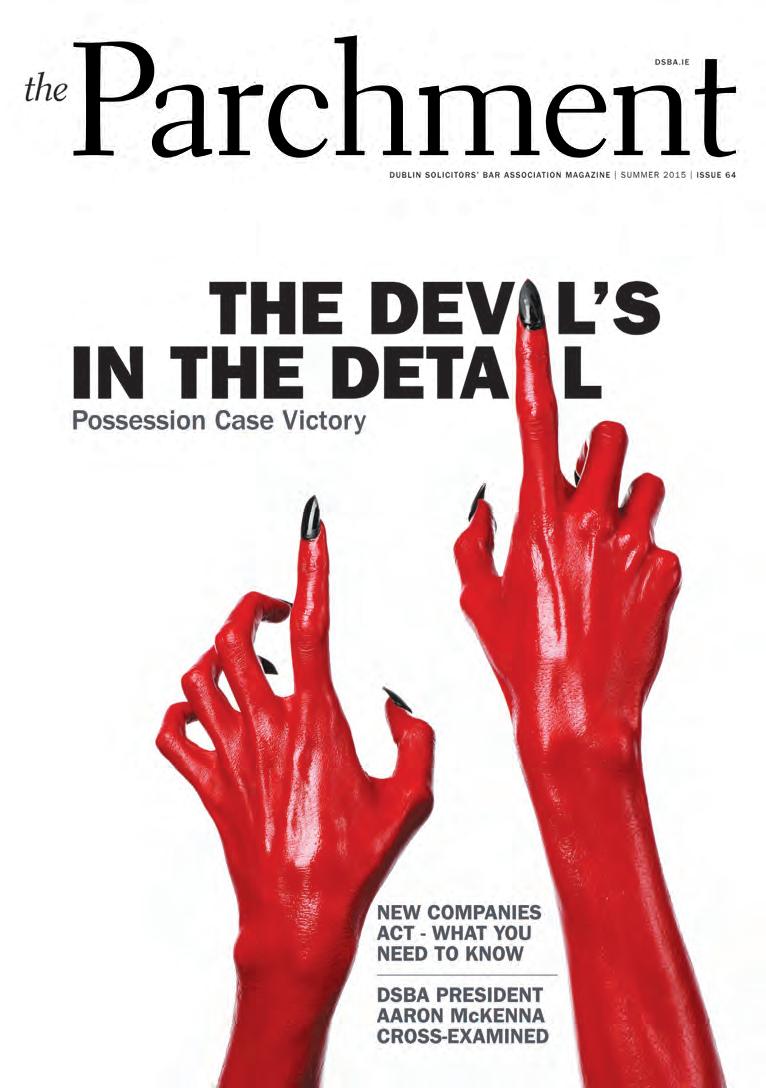


If not, please contact Maura Smith.
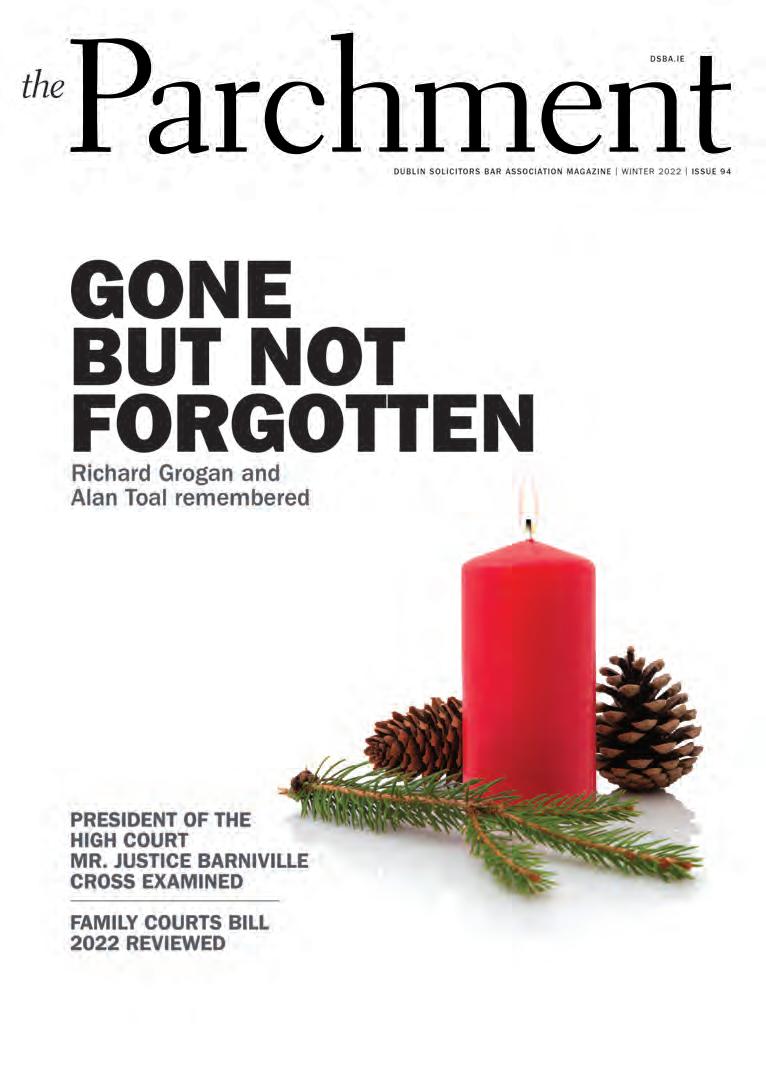
If not, please contact Maura Smith
Dublin Solicitors Bar Association, 1st Floor, 54 Dawson Street, Dublin 2, Ireland.
Dublin Solicitors Bar Association, Unit 206, The Capel Building, Mary’s Abbey, Dublin 7, Ireland.


Tel: 01 670 6089 • E-Mail: info@dsba.ie • Update your personal details online at: www.dsba.ie
Tel: E-Mail: info@dsba.ie • Update your personal details online at: www.dsba.ie

Queen Collaborator
Long-time California “Super Lawyer” Pauline Tesler met up with Avril Mangan on her trip to Dublin recently. In a lengthy discussion between the two family lawyers, we extract parts of the interview dealing with Collaborative Law – an international movement that is changing family law in many countries
AVRIL MANGAN: You said recently that all litigated divorces are done poorly, what do you mean by that?
PAULINE TESLER: What I mean is that all they can resolve is legal issues. Litigated divorces focus on achieving results that a Judge is permitted to issue orders about, abiding by the rules of evidence as to what’s admissible and only justiciable issues are discussed because that’s all that a Judge can do, and what the client cares about, what a family cares about if you ask your client what they’re waking up in a panic attack about at 3 in the morning, it’s not something that fits into the frame of the justiciable issue. They’re worried about how they’re going to pay the bills and they’re not talking about what the Court’s going to order for support. They’re trying to figure out how to balance the chequebook so that they can put food on the table and shoes on the children, and Judges are not concerned with that. We do things that relate to that but the client’s concerns if you visualise it as an iceberg, mostly are emotional and financial. The legal part that addresses the consequences of the emotional and financial concerns – the legal issues – are just the tiniest tip of the iceberg. So by definition I think if you’re taking it to litigation you’re excluding most of what a client is most upset about. Because what they’re most upset about is the collapse of their lives.

A: And then a legal system that says: well now we have to decide how we’re going to divide this pot and you can have this and you can have that and off you go and everything will be fine …
P: And please don’t bother us with your opera because we are not an opera house; we’re not concerned with that. Whereas in collaborative divorce
what we’ve learned is that first of all you cannot force things to go more quickly than they’re able to go. In basic trainings I sometimes use the metaphor, you’d probably call it a sack race; we call it the three legged race, that kids do at field days where it’s a race where two kids are… each has one foot in a burlap bag and you’re trying to run to reach the finish line and what you learn after doing some of those is that the person who goes the fastest falls down quickest.
A: Very good analogy. Full financial disclosure in Ireland as in most jurisdictions is a key element. So is there meant to be a commitment to full financial disclosure by both parties in collaborative divorce? What do you do when you discover your client has not been fully truthful about their finances? Does it bring the collaborative process to an end? How do you move on from that?
P: Well first of all it’s surprisingly rare. I have never had a case, although the ethical rule is that if a client refuses to make disclosures I’m a lawyer, I’m bound by lawyer client privilege. My client says to me ‘oh by the way I have a Swiss bank account with a lot of gold, ancient Krugerrands in it and you’re not to say anything about it’, I cannot say anything about that. But my engagement letter with my client and the ethics that govern this work – the International Academy’s standards and ethics – say that the process cannot continue on that basis. My engagement letter informs the client that if after being counselled and advised and urged to make a disclosure the client still refuses to do so, that’s a constructive termination of the collaboration and I will implement that and communicate that constructive termination instruction immediately. I will not continue on behalf of the client.
The collaborative process is much better at dealing
52 the Parchment

the Parchment 53
Winter 2022 dsba.ie
Family Law
Avril Mangan is a principal of Mangan and Co. Solicitors She is a Council member of the DSBA
By the time they leave law school the general population is about 12% significant clinical depression; the graduating law students 30% of them have significant depression
with disclosure than a litigation process would be because if I’m a litigator and my client tells me that’s everything, I tend to believe that it’s everything - but in a collaboration where we have the neutral financial expert who’s much more than a bookkeeper, who’s accustomed to following paper trails, who gets full disclosure from both parties, not just one person’s view of what’s complete and then that person follows the paper trail and sees that there’s something missing here, which they will, then all they have to do is say so and it’s the lawyer’s job to say ‘come on, go look for it, you didn’t do a thorough enough job yet’. That’s how it plays out.
A: Do collaborative divorces fail, and what happens then? It goes to Court?
P: It’s a theoretical concern that people new to it always will ask about: what happens if it terminates and they have to lose me as their lawyer? There’s a fair amount of egoism involved I think. When litigators ask that, as if they are the only lawyer in town who could possibly take over afterward, but it happens that the data internationally, which includes the newest and least experienced practitioners – the bumblers, the ones who aren’t good at anything at all and aren’t good at this either – considering all of those people are folded into this database, the figure is under 10% of the people who begin it don’t finish it.
A: Can I ask you, what words of encouragement would you offer to solicitors in Ireland who are thinking about adding collaborative family law to their practice? And as an add-on to that question, do you think that saying 97% of cases can be done collaboratively – and the fact that this is not happening means you are not doing something right – is off putting and may discourage people to think about starting this approach?
P: First of all, it’s very important that anybody who’s conducting a basic training in collaborative practice makes it clear that you’re not coming out of a two day or a three day training as a full-blown collaborative lawyer. What you’re coming out as is somebody who’s ready to be a beginner. And the learning happens on the job with your colleagues; your colleagues are your best teachers, so the expectation has to be that you’re going to bumble around at first: we all do. And you’re going to make mistakes and the mistakes are where the learning happens and so you need to be embedded in that practice community where you develop those relationships with your colleagues where you can have the candid conversations, the debriefing conversations that are built into the structure and learn how to do better the next time. This applies also to how you handle the initial consultation that leads to the client choosing collaboration. You’re not going to do that well at first, but gradually if you’re willing to learn new habits and that’s the big if: if you’re willing to question what you’re doing then you’ll learn how to do it better and the practice group itself can conduct exercises to help you learn the process. We taught it in the training, and it’s easy except that everybody for the first time when they’re experimenting with itand it happened at the training and it’s kind of fun to
realise, because you’re all experienced people – suddenly, you’re speechless. Here you are in an initial consultation with a client, you’re role-playing it at the training, but you’re in an initial consultation that you could do half asleep by this point in our career if you’re doing it in the litigation mode, and you suddenly think to yourself: oh, what do I say now? I have no idea what to say next. That’s where the learning happens. People who have barriers to becoming a beginner, or not becoming a beginner but what the Buddhists call assuming beginner mind, are going to say at that point: it doesn’t work; my clients are different from your clients and all the other clients all over the world. My clients are different. It’s a kind of… it’s a cognitive bias really. When we have to give up something that we’ve held as second nature in order to incorporate something new, an internal struggle takes place. It’s called cognitive dissonance. Everything that I thought was what I was supposed to be doing suddenly is not helpful and either I have to say well that’s just a load of nonsense and my clients don’t want it or I have to say: this is interesting, I’ve got some learning to do here and it’s exciting and I’ll get to do a kind of practice that will be infinitely more satisfying than what I’m doing now.
A: I don’t want to admit to my colleague who I’m going head to head against in the High Court in another case that I can’t do this and that I’m not the best at what I do. Your ego gets in the way of helping you progress, so I suppose it’s maybe what you’re saying is it’s having a good support network in those practice groups that you have a safe space where your ego doesn’t matter.
P: You have a safe space in which you realise that every single one of us is stuck being a perpetual learner when we’re doing this because it’s not in our control anymore. Each time we do a case we’re entering into a new human system that is entirely unpredictable.
A: You say that collaborative divorce is highly beneficial for parties with children, and this is probably a yes/no answer really: what if there are no children? Do you still advocate the collaborative approach?
P: I would say it depends. When I do a consultation with a client who tells me that it’s a three or four year marriage, they’re both well-employed, there aren’t any support needs and they don’t have much property, I’m going to send them to a mediator. I’m not going to advise all of the process that collaboration involves. But if out of that conversation, even for a couple like that, a highly charged emotional issue emerges then what I would say is that collaboration has something to offer to you if you want to come out of this feeling more whole and with some degree of cordiality toward your ex, and if those motivations are there then it might be appropriate in a somewhat more limited way, using coaching, life coaches for example. You know, we’ve heard all the stories that ordinary lay people would think are impossible about the husband having the affair with the sister or the best friend.
A: Would you do a collaborative divorce with a solicitor who you don’t know or who is not
54 the Parchment
known for their collaborative experience? For example, do you only work with people you know?
P: Well if it’s somebody who really I don’t think I can work well with then I think that I do have an obligation to let my client know that in a way that’s tactful and ethical, and what I would say would be something like this, and I have done this a few times: I would say I know this person, I know that they’re a member in good standing of either my practice group or a practice group, there’s no reason why your wife can’t be represented by that person collaboratively but the thing that is money in the bank for people who choose collaboration is to choose two lawyers who’ve got a good track record together because then I can guarantee and the other lawyer can guarantee that whatever happens we are not the problem, we’re the problem solvers. And I cannot say that about this person; I haven’t had that experience with this… I wouldn’t say I had bad experiences, but I would say I have not got that track record with this person.

A: You’ve spoken about bringing empathy into legal practice and transforming the legal profession into a healing profession, which sounds great. What advice would you give to Bar Associations such as the DSBA in trying to achieve this?
P: Well I think the beginning is to normalise, and I know that there is this organisation that’s emerged called Solicitors’ Growth. I think it needs to be brought right into the heart of the Bar Associations and the organisational structure that’s the mainstream place where lawyers meet. There’s plenty of hard solid social science research about the impact on lawyers’ health. There’s a name for it – vicarious trauma – of working every day with people who are in such intense conflict and not being able to do much to really fix that so that even when we do our best work there’s nobody who comes and says: wow, wasn’t that a great job you did, thank you so much for making my life better. It doesn’t happen very often. And the impact of that vicarious trauma over time, the data for the American legal profession, and I cannot believe it would be different here, is that – there are charts that I use in a programme that I give about stress and trauma in law practice. When people start law school in the United States the incidence of clinically significant depression is a little bit higher than the general population but not substantially higher. By the time they leave law school [while the general population has about 12% significant clinical depression] the rate for law graduates is 30%. By the time they have practised for any number of years you start to see the charts for alcoholism, drug abuse, suicide.
A: Shocking.
P: Serious depression, the kind that needs medical attention really escalates, and this is what vicarious trauma does. Nobody wants to talk about that. In the United States the American Bar Association has taken that on as a serious challenge because that’s a lot of lawyers leading miserable lives by the time they’re in their forties and fifties. And I don’t know if you sense that that’s true here or not?
A: Can I ask you to explain the integrative law movement, what is that about?
P: Well, I’ve been doing collaborative trainings ever since the late 1990s and I started being asked to do more and more advanced trainings. They focus more and more on the internal growth that occurs in an individual inevitably as you start to really understand the nature of conflict and conflict resolution, what is called for from you when you enter into a human system that is the team around the clients, who do you have to be and what skills and understandings would be valuable for you to bring into the room that are from all of the other disciplines that have something to say about the nature of human conflict, for example social psychology, anthropology, new studies of brain… emerging brain science about how the brain and the body actually experience conflict, what I was talking about at the training about the impact on cognition. Bringing in body mind awareness practices so that you can develop techniques for calming yourself.
We lawyers tend – without really looking at it very closely – to assume that the conflict is about them or about it but never about us. But when we come into a room with our client and our client’s angry, what happens to me, what happens to you when somebody has an outburst? You can’t help but mirror, because that’s how our brains are made. We mirror anything that’s going on in the room, that any other human being is doing and so self-awareness and self-regulation, both in terms of making sure that we remain a constructive presence in the room and in terms of being able to harvest this wealth of biochemical and social psychology information that’s present in the room that will tell us what’s happening before it happens and it will give us tools for dealing with it that come from places other than the intellect, that’s what the integrative law movement is about.
the Parchment 55 Family Law Winter 2022 dsba.ie P
Áine Hynes SC tipped for AG
Readers of the Irish Times may have seen recently that former DSBA President Áine Hynes was among a handful of names that the paper of record was mooting for the next Attorney General.
According to the Irish Times, the solicitor and Senior Counsel, Áine Hynes, is speculated among a short list of candidates being considered for appointment to the office of Attorney General.
A graduate of UCD, DIT, the Institute of Taxation and Friary Law, Áine was admitted to the roll of solicitors in 2001 and was one of the first solicitors to be granted a patent of precedence in this jurisdiction.
She has been a member of a number of the Law Society expert committees since 2007 and is a member of the Council of the Law Society.
As Chair of a Division of the Society’s Regulation of Practice Committee, she chairs hearings in respect of potential breaches of regulatory requirements and executes the Division’s statutory power of referral to the High Court for various disciplinary-related orders.
Áine also chairs the Mental Health Law & Capacity Taskforce which has led the Society’s response to the new assisted decision-making legislation, making
extensive submissions to the Departments of Justice and Children, Equality, Disability, Integration and Youth, on necessary amendments to the new framework.
A co-author of Special Needs Financial Planning: A Comparative Perspective (Cambridge University Press) and Complex Conveyancing (Bloomsbury), Áine has also written extensively across areas such as judicial review, mental health & capacity law, litigating for vulnerable adults and the Hague Convention.
She shares the role of managing partner of Dublin law firm, St. John Solicitors, where she manages a busy, specialised and dedicated team of lawyers and support staff, overseeing interactions with clients across diverse areas of law which include public & administrative, conveyancing & taxation, constitutional, employment, procurement and commercial contracts.
Having acted in more than 1,000 cases before the Mental Health Tribunals and the Mental Health (Criminal Law) Review Board, Áine was appointed to the position of chair of the Mental Health Tribunals in 2019 which requires substantial knowledge of medical diagnoses and treatments, the taking and testing of evidence from patients and psychiatrists while ensuring that

patients are listened to and heard.
She was appointed by then Minister of State for Mental Health Kathleen Lynch to the Expert Steering Group on the Review of the Mental Health Act and, more recently, by Minister for Justice Helen McEntee to the Civil Legal Aid Review Group which is conducting the first review in the 40 year history of the Scheme, under the chairmanship of retired Chief Justice, Mr Frank Clarke.
We at the Parchment are particularly proud of Áine as she is a much-valued member of our Editorial steering committee.
Lawyers Against Homelessness
There are over 100 “no shows” for Central Office appointments every week. These slots simply go to waste and reduce the availability of appointments for colleagues who need them. If you or a colleague no longer need a reserved slot for any reason, please cancel the appointment so that the slot can be offered to somebody else. This is simple and helps everybody.
Killian O’Reilly, DSBA Litigation Committee
Congratulations to our friends at the Bar who continue to organise CPD events in support of the Capuchin Day Centre. A stellar line up of speakers addressed the CPD lecture on the 17th November 2022 which included The Hon Mr Justice Paul Coffey, His Honour Judge John O’Connor, Judge Marie Quirke, Dr Val Corbett, Liam Reidy SC, Edward Walsh SC, The Hon Ms Justice Marguerite Bolger, the late Richard Grogan, Solicitor, Mairéad McKenna SC,
Rosemary Mallon, BL, Eamonn Marray BL, Michael Gilvarry BL, Barry Lee, Solicitor and Ailbhe Kelly BL.
To date, and after their ninth CPD event at the Capuchin Day Centre, Lawyers Against Homelessness have raised over €220,000, all of which has gone direct to the Capuchin Day Centre to assist in defraying the enormous cost of running the facilities provided to the homeless through the Capuchin Day Centre.
56 the Parchment News
‘No Shows’ at Central Office –Cause for Concern








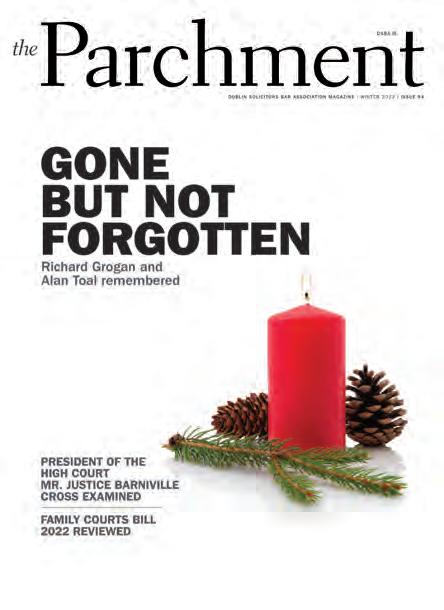

THE DUBLIN SOLICITORS BAR ASSOCIATION Dublin Solicitors Bar Association, Unit 206, The Capel Building, Mary’s Abbey, Dublin 7. Phone: 01 6706089 | FAX: 01 6706090 | DX: 200206 Capel Building. www.dsba.ie TO ADVERTISE CONTACT: SHARON HUGHES TEL: 086 871 9600 E: SHARON@256CONTENT.COM



LONDON 15 – 17 SEPTEMBER 2023
DSBA ANNUAL CONFERENCE 2023
50+ years in Practice
A lunch was hosted by the DSBA in honour of Dublin Solicitors who are 50 years (or more) in practice on 7th October 2022 at the RDS, Ballsbridge. There was a large attendance to mark this very special occasion which had not been held since before Covid-19.






Far

60 the Parchment
Left: Sean Sexton addresses the gathering
left: Peter Kirwan, Rose Mary Kirwan and DSBA President Diego Gallagher
Left: Gordon Henderson and Thelma King
Far left: Stephen McKenzie and Peter Maguire
Left: The scene in the RDS for the gathering to celebrate Dublin solicitors who have been in practice for 50 years or more
Right: Brian Duncan, Dudley Potter and Sean McDonnell
Far right: Justin McKenna, Judge Patrick McMahon and John Fitzpatrick
Right: Aidan McNulty, Bernadette Malone and Sean Patrick Corrigan

Far right: Derek Greenlee and Eric Bradshaw
Left: Sean McDonnell, Leo Mangan and Hugh Cunniam

Far left: Con Clancy and Rory O’Donnell
Right: Paul Beausang, Brian Gallagher and Terence Liston



Far right: Raymond Moran, Barry O’Neill and Aidan McNulty
Left: Michael O’Hanrahan, Brian Gartlan and Anthony Brady
Far left: Dudley Potter and Paul McCormack



the Parchment 61 Winter 2022 dsba.ie
Photography: Owen O’Connor
TAKE-AWAYS FROM THE PRA ANNUAL REPORT 2021
The Property Registration Authority (PRA) recently published its Annual Report for 2021. There are some interesting statistics contained. Here is a flavour of the main take-aways from this Report.
Despite the challenges presented by Covid-19 the PRA has reported an increase in productivity noting the following:
• In 2021 the PRA received 199,585 applications for registration; the correlative output amounted to 180,033 applications which illustrated a large increase of 30,727 additional applications completed in 2021 in comparison with the previous year.
• While there was an increase in the intake and output of applications for registration from 2020 to 2021 (14% and 23% respectively), the net output for applications for registration also improved.
• In terms of applications for registration that are still in progress the figure is quite high, 99,325 applications were ongoing at the end of 2021, highlighting a 23% increase
compared to the figure at the end of 2020. These figures suggest that there is a backlog of applications for registration from previous years leading to a larger number of work in progress applications.
• The number of First Registrations requiring an examination of title rose by 33% in 2021. This raises the question of whether this increase is due to fewer solicitors certifying title or if it is perhaps reflective of rising residential property prices. Furthermore, the output of Examiners Cases rose from 4,819 in 2020 to 8,054 in 2021 while the amount of Examiners Cases that were a work in progress dropped from 11,676 at the end of 2020 to 9,034 at the end of 2021. These figures reflect a substantial increase in productivity and a reduction in the backlog in First Registrations requiring an examination of title.
• Counter-Fraud Initiatives remained central to the PRA’s work in 2021 and several Information and Awareness Initiatives were
RESIDENTIAL ZONED LAND TAX
The DSBA Property Committee wishes to draw practitioners’ attention to the recently introduced provisions of the Finance Act 2021 and some action points to follow up with clients.
What type of land does it apply to?
• It applies to land which on or after 1 January 2022 is zoned as being suitable solely or primarily for residential use (and serviced for development as such).
• Where agricultural land meets the above criteria, owners of agricultural land will be liable for RZLT.
• Existing residential properties may appear on zoned land maps as published by each local authority but they are excluded from the scope of RZLT but an obligation to register with Revenue Commissioners arises where the curtilage of the residential property is greater than 0.4047ha (1 acre).
What types of properties are excluded from RZLT?
• Residential dwellings and gardens.
• Facilities for utilities, social, community or recreational purposes.
• Land which has a physical condition which may impact the ability to provide housing on the land.
• Land designated as a Derelict Site under Derelict Sites Act 1990.
• Land which although zoned residential is a rateable business and provides services to local residents e.g a neighbourhood shop
• Mixed use land – only vacant or idle land is included within the scope of RZLT.
(RZLT)
What is the rate of RZLT?
RZLT will apply annually at a rate of 3% of the market value of the land. The land will be revalued every 3 years from the initial valuation date. This is a self-assessment tax so like Local Property Tax the property owner determines the market value. Surcharges may apply if the land is later found to be undervalued. RZLT is administered by Revenue Commissioners and not the local authority.
Note Vacant Site Levy continues to apply (note this is at a rate of 7% of market value) but it will be replaced with RZLT in due course. Any unpaid Vacant Site Levy remains a charge on the property to be collected by the local authority.
When will a landowner be first liable to pay RZLT?
• Due 1 February 2024 and payable in May 2024 for applicable land as of January 2022.
• Where land becomes zoned and serviced in subsequent years then RZLT will be chargeable in the third year after the year in which it comes within scope of RZLT.
• Where land liable to RZLT is under appeal to An Bord Pleanála, RZLT may be deferred pending the outcome of an appeal. This only applies where the land is subject to a third party appeal. If the appeal overturns the grant of planning permission then any deferred tax is due for payment.
• Where land subject to an appeal is sold prior to outcome of the appeal, the landowner must pay any tax which has been deferred prior to the completion of the sale.
run to raise awareness about fraud prevention methods to protect both the PRA and property owners. These included a particular focus on the Property Alert Service available on landdirect.ie. This service gives the owners of registered property the ability to be notified by email or text when an application has been lodged with the PRA to update the Land Register, therefore granting further protection against fraudulent applications.
• The PRA also provided the following breakdown regarding Service Delivery Targets. The PRA achieved 99% of its target to have 100% of electronic applications for registration completed within 10 working days. In addition to fulfilling an objective to issue 95% of copy folios and title plans within 24 hours of an application. However, it is interesting to note the absence of a target regarding the issuing of copy Instruments which according to many can often take a period of 12 to 16 weeks.
DSBA Property Committee
Action Steps for Clients
• Now - Review residential zoned land maps on local authority websites to check if land has been designated as within scope of RZLT.
• On or prior to 1 January 2023 – make submissions to local authority regarding removal of land from the RZLT maps where it is believed it has been incorrectly included.
• Late 2023 – obligation to register a residential property on lands of more than 0.4047ha (1 acre) where the property has been designated for RZLT (even though RZLT not payable).
Right of Appeal
• On 1 April 2023 the local authorities will write to landowners notifying them of removal or retention from the RZLT maps. A landowner may appeal the decision to An Bord Pleanála on or prior to 1 May 2023.
• There is a further round of submissions/ notifications/right of appeal for properties included in supplemental maps published in May 2023.
When does RZLT cease to apply?
• When homes are developed on site and completed; or
• Where land is zoned for mixed use – when a non residential development commences construction; or
• Where the zoning is changed such that it is no longer suitable for residential development; or
• Where after publication of final map – the land becomes unsuitable for residential development.
Roisin Bennett DSBA Property Committee
In Practice 62 the Parchment
DSBA AGM
New DSBA Council 2022/2023:
Front row (left to right): Joan Doran, Niall Cawley, DSBA President Susan Martin, Matthew Kenny, Paul Ryan. Back row (left to right): Eimear O’Doherty, Ciara O’Kennedy, outgoing DSBA President Diego Gallagher, Patrick Longworth, Jessica Hickey, Stefan O’Connor, Ciara Hallinan, Gerard O’Connell, Avril Mangan, Killian O’Reilly
Right:
Far right: Outgoing DSBA President Diego Gallagher
The AGM of the Dublin Solicitors Bar Association took place at the Westbury Hotel on the 26th October 2022. The AGM was extremely well attended as it signalled the end of Diego Gallagher’s successful year as President.





Susan Martin took over the reigns at the helm of the DSBA with Matthew Kenny installed as Vice President of the DSBA.
Stefan O’Connor was newly elected as a DSBA Council member.
Left: Stefan O’Connor, Susan Martin, Diego Gallagher and Matthew Kenny Far left: DSBA President Susan Martin and Sonia McEntee

Left: Morette Kinsella, DSBA President Susan Martin and Bernadette Cahill Far left: Outgoing DSBA President Diego Gallagher and Helen Sheehy

the Parchment 63
Winter 2022 dsba.ie
Photography: Bryan Meade
Seona Ni Mhurchu, Diego Gallagher and Paul Ryan
DSBA AGM








Left
Far
Left:
Left:
Far
64 the Parchment
Ciara Hallinan and Susan Martin
left: Emma McLoughlin and Elaine Given
Richard Hammond SC and DSBA President Susan Martin Far left: Brian Gallagher and Joan Doran
to right: Newly elected DSBA President Susan Martin addresses the AGM
left: Niall Cawley and Ciara O’Kennedy
Right: Matthew Kenny and Tom Menton
Far right: Gerard O’Connell and Patrick Longworth


IF IT FEELS LIKE THIS JUST FELL ON YOU WE’RE HERE TO HELP Consult a Colleague now in total confidence Call us on 01 284 8484 All calls to the Consult A Colleague helpline are treated in the strictest confidence - there is no need to give a name or number. A confidential free service from the DSBA.





cort@cortsite.com www.cortsite.com 01 683 1927 CORT2019 CORTBase Requisitions on Title Case & Risk Management Legal Accounts CORTBase CORT Software for Solicitors Innovative - Affordable - Reliable Innovative design making this the easiest and the fastest legal accounts system available today Simple user interface and dedicated support line to help you maximise efficiency and productivity
by the DSBA and licensed by the Law Society of Ireland to reproduce the Requisitions on Title
Approved









































































































































































